

Rest Areas Overnight RV Parking Rules By State – UPDATED 2024
Last Updated on March 7, 2024

Table of Contents
Some RV parks can be $30 or $40 or night, but if you are just stopping and heading out early, this may be too much to pay. There is also the option to stay at a rest stop. Rest stops are different all across the country. Some allow RVers to stay as long as they need and others have time limits. Every rest stop also varies when it comes to how strictly these limits are enforced.
Rest stops do not allow camping , but sleeping in your RV is not considered camping . This means, there are many rest areas where you can pull the RV over and sleep for a night. Some rest stops may even provide access to national parks. When planning out your trip, look for rest areas that allow overnight RV parking. Some will have small fees, so you need to be prepared. The DOT can help with any questions you may have about rest areas and RVing. I’ve stayed in some amazing rest areas like the Bear Lake Rest Area in Utah on Route 89 with beautiful lake views and hiking trail but there are Rest Stops like the Iowa 80 truck stop which is the largest truck stop in the country with a movie theater, restaurants, and even a trucking museum.
See Rest Area Overnight Rules By State
Is It Overnight Parking Or Camping?
Camping is categorized as a recreational activity and pitching a tent and campsite. This is not allowed in rest areas anywhere across the country. Rest areas are designed to give tired drivers a break, and this includes RV drivers. Long-distance truck drivers have cabs to sleep in and RVers have their own beds. No tents or sites are set up, so it is not camping. The rest area is being used for resting, not recreation.
Where things get confusing, is that many rest areas have established facilities in the area that are consistent with recreation. There are often grills, tables, play areas, bathrooms, access to trails and viewing areas, and some even have museums or exhibits. These encourage visitors to stick around and have fun, but yet, camping is discouraged. And, not allowed.
Activities at rest areas are to be finished by the time the sun goes down. Most states consider any nighttime activity recreational and camping. They do not want tents posted or fires burning all night. RVers can enjoy these facilities during the day, so long as they are all packed up into the RV at night. The expectation is that you will get your rest and then be on your way the next morning.
What are Rest Areas?
You can usually find a rest area every hour or so along major highways. These were constructed for road safety as part of the Federal-Aid Highway Act of 1956. The idea was to give drivers rest to prevent them from having accidents as a result of being tired. The highways in the country pass through all places, many of which end up in very isolated spots. Hence, some facilities are also in place to better facilitate those who stop.
With the addition of these facilities, a new policy was created by the American Association of State Highway Officials. This set guidelines for the rest areas including when you can stay overnight with an RV. Sleeping in an RV at a rest stop depends on the state you are in and the rest stop.
Rest areas are designed to keep the roads safe by giving sleepy drivers a place to rest. RVers that are doing more than this, may be asked to leave, depending on the state and rest stop.
Most states prohibit camping at rest stops and specify that resting is not camping. The length of time you “rest” is important to whether you are camping or not. RVers can pull in to rest stops, park, and sleep, but they cannot open a pull-out.
[amazon table=”11051″]
How Safe Are Rest Areas?
Unfortunately, most rest areas are poorly lit and can be prone to crime. Many states have banned sleeping at rest stops due to increased crime, and many others have put up signs that discourage it. You probably heard some horror stories that happened in rest areas. There have been robberies, solicitations, and even murders. The chance of serious crime happening is generally low. You have to use common sense like anywhere and if you are alone, don’t attract too much attention. The most common trick is a stranger knocking on your door asking for money or trying to lure you away with a story to rob your rig. You should be suspicious of any stranger knocking on your RV door and DO NOT open the door if you have any doubts about the person’s intentions. Talk to any strangers through the window or door, and if you feel threatened, drive away. Have some security systems set up (see my article about The Best RV Security Systems ). Use security cameras, alarms and have your cellphone nearby. What else should you do?
Choose Well-Lit Areas
Well-lit areas discourage crime at rest areas. While crime can occur at any time of day, a rest area is most dangerous after the sun goes down. During the night, avoid peripheral parts like wooded areas, picnic areas where illegal activity sometimes occurs. Try to choose rest areas where there is a security guard and try not to go to the bathroom alone.
Park Near Other Cars
When you decide to stay in a rest area, avoid the ones that are deserted and you are the only one. Whenever it is possible, park near other cars, trucks or RVs but don’t block your view of seeing your surroundings. Thieves don’t like to target you if they believe help might be close.
Carry Protective Devices
Alarms, lights, pepper spray can be all-important prevention. Most RVers do carry a gun. Regardless of the protection you choose, make sure you know how to use it. If you carry a firearm, ensure you have the proper permits for it. See my blog post about guns in my RV Personal Protection blog post.
Choose Pull-Through Parking
If you do run into trouble, you need to be able to leave quickly. Pull-through parking helps reduce the time you need to pull out of the rest area. If you cannot locate this type of parking area, back into an area that will allow you to pull out easily.
Avoid Rest Areas Close To Big Cities
Criminals are usually lazy and won’t drive to the middle of nowhere to commit crimes. There is undeniably more crime near large cities. Just be aware if you are close to a big city that might be less safe.
Time Limits on How Long You Can Stay
Most rest stops in the country have developed maximum time limits for staying. They can range from as low as two hours to as long as twenty-four hours. Some have no limits at all and in many cases, Highway Patrol does not enforce the limits strictly . States want the roads to be safe and have places for drowsy drivers to rest. Law enforcement only gets involved, if someone stays at a rest area for too long.
Parking Overnight at a Rest Area Without Getting into Trouble
You can stay in a rest area as long as you are tired. As long as you are not setting up camp and spend most of your time inside the RV, it should be fine. If it looks like you are just resting for the night, law enforcement will not bother you.
Rest areas are only for resting. Don’t ruin it for everyone. When you decide to stay in one, stay inside the RV and do not open up the awning. Do not play music and set up chairs or a grill. Keep the lights low to keep up the appearance that you are resting. Try not to draw attention to yourself and you will not be bothered. You can rest as long as you need to, even if it does go beyond the specified limit. Then just leave the next morning.
Interstate Rest Areas Overnight RV Parking Rules By State
(local dot phone numbers and websites).
334-353-6554 https://www.dot.state.al.us/ You can unless it is posted otherwise
907-465-3900 www.dot.state.ak.us Unless it is specifically posted otherwise, you can stay overnight in your RV, without a problem.
602-712-7355 http://www.dot.state.ak.us/ You can stay in rest areas overnight
916-654-2852 https://dot.ca.gov/ 8-hour limit to stay
303-757-9011 https://www.codot.gov/ Overnight parking is not allowed
Connecticut
860-594-2000 http://www.ct.gov/dot No rules against staying overnight
302-760-2080 https://deldot.gov/ The Smyrna Rest Area has max 8 Hour Parking Limit The I-95 Welcome Center allows overnight stays
850-414-4100 https://www.fdot.gov/ 3-hour stay limit, no overnight
404-631-1990 http://www.dot.ga.gov/ Yes unless otherwise posted Visitor areas don’t allow overnight stays
808-587-2160 hidot.hawaii.gov No overnight parking
208-334-8000 itd.idaho.gov 10-hour stay limit
217-782-7820 https://idot.illinois.gov/ 3-hour stay limit, no overnight parking
855-463-6848 https://www.in.gov/indot/ You may sleep in your RV if you are discreet
515-239-1101 https://iowadot.gov/ You can park for less than 24 hours
785-296-3566 http://www.ksdot.org/ You can stay one night only
502-564-4890 https://transportation.ky.gov 4-hour time limit
877-452-3683 http://wwwsp.dotd.la.gov Can stay to rest, let the security guard know, but officially no overnight parking
207-624-3000 https://www.maine.gov/mdot/ It’s ok if you are discreet
410-865-1000 https://www.mdot.maryland.gov 3-hour stay limit, no overnight
Massachusetts
877-623-6846 https://www.mass.gov/orgs/massachusetts-department-of-transportation Yes, unless posted otherwise. You cannot leave vehicles for more than 30 unattended
517-373-2090 https://www.michigan.gov/mdot There are no rules. So unless it is posted differently, you can.
651-296-3000 http://www.dot.state.mn.us/ Yes if you are discreet. No more than 4 hours if you don’t remain in the vehicle
Mississippi
601-359-7001 https://mdot.ms.gov/ Overnight parking is permitted, but don’t stay longer than necessary
888-275-6636 https://www.modot.org/ Overnight parking permitted
406-444-6201 https://www.mdt.mt.gov/ Overnight parking permitted
402-471-4567 https://dot.nebraska.gov/ 10-hour stay limit
775-888-7000 https://www.dot.nv.gov/ 18-hour stay limit
New Hampshire
603-271-3734 https://www.dot.nh.gov/ Yes unless otherwise posted
609-530-200 https://nj.gov/transportation/ Overnight parking is permitted unless otherwise posted
505-827-5100 https://dot.state.nm.us/ 24-hour stay limit
518-457-6195 https://www.dot.ny.gov/index 3-hour limit, or 4 hours on Thruhways
North Carolina
877-368-4968 https://www.ncdot.gov Overnight staying is not allowed
North Dakota
701-328-2500 https://www.dot.nd.gov/ Overnight parking is allowed
614-466-7170 https://www.transportation.ohio.gov There are no rules against overnight parking
405-521-2557 https://www.odot.org/ Overnight parking is ok
888-275-6368 https://www.oregon.gov/odot 12-hour stay limit
Pennsylvania
717-214-4035 https://www.penndot.gov 2 hours stay limit unless otherwise posted
Rhode Island
401-222-2450 http://www.dot.ri.gov Overnight parking is allowed
South Carolina
855-467-2368 https://www.scdot.org/ No overnight parking
South Dakota
605-773-3265 https://dot.sd.gov You can stay only up to 3 hours
615-741-2848 https://www.tn.gov/tdot.html 2-hour stay limit
512-463-8588 https://www.txdot.gov/ 24 hours stay limit
801-965-4000 https://www.udot.utah.gov You can stay as long as you are combating driving fatigue
802-828-2657 https://vtrans.vermont.gov/ No overnight parking unless otherwise posted
800-367-7623 http://www.virginiadot.org/ In some well-lit rest areas overnight stay might be ok No clear rules – police may ask you to leave
360-705-7000 https://wsdot.wa.gov/ 8-hour stay limit
West Virginia
304-558-3505 https://transportation.wv.gov/ Overnight parking is allowed
608-244-5310 https://wisconsindot.gov/ You can rest up to 24 hours
307-777-4375 http://www.dot.state.wy.us Overnight parking is ok
Related Posts
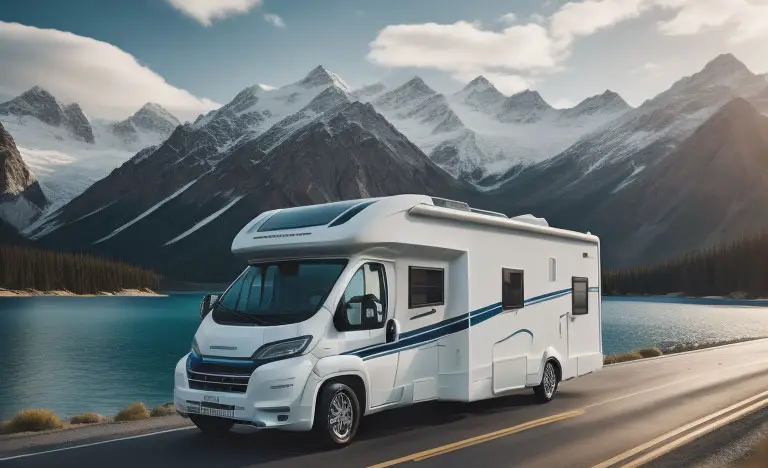
Common Questions About RVing in Europe Vs The U.S. – Should You Transport Your RV or Rent One There?

Converting A Van To A Campervan
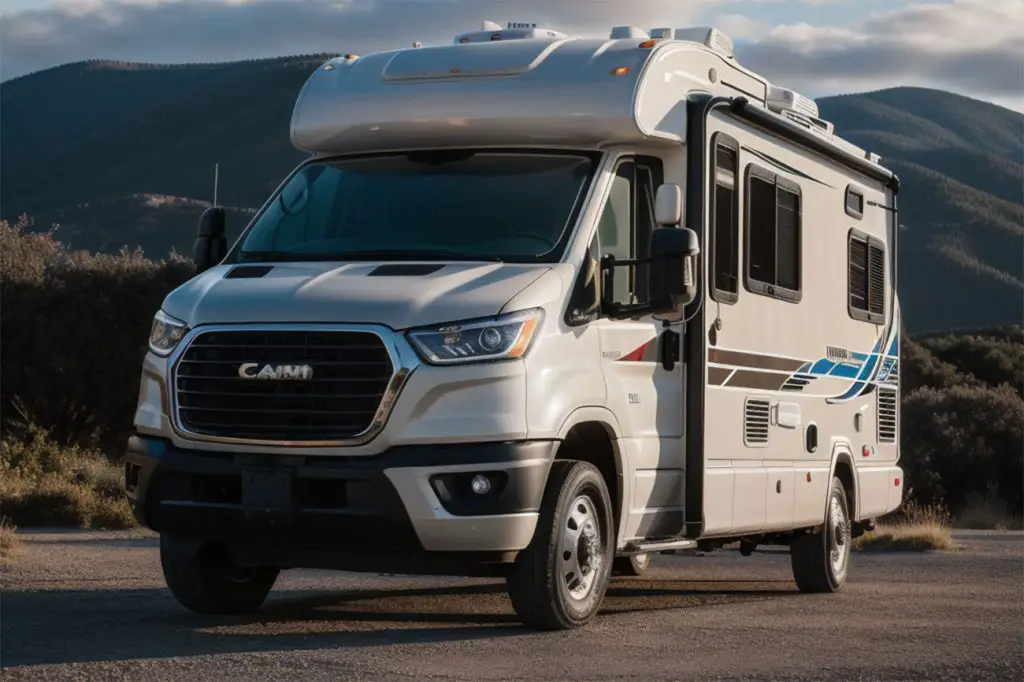
READ THIS BEFORE Renting A Small RV
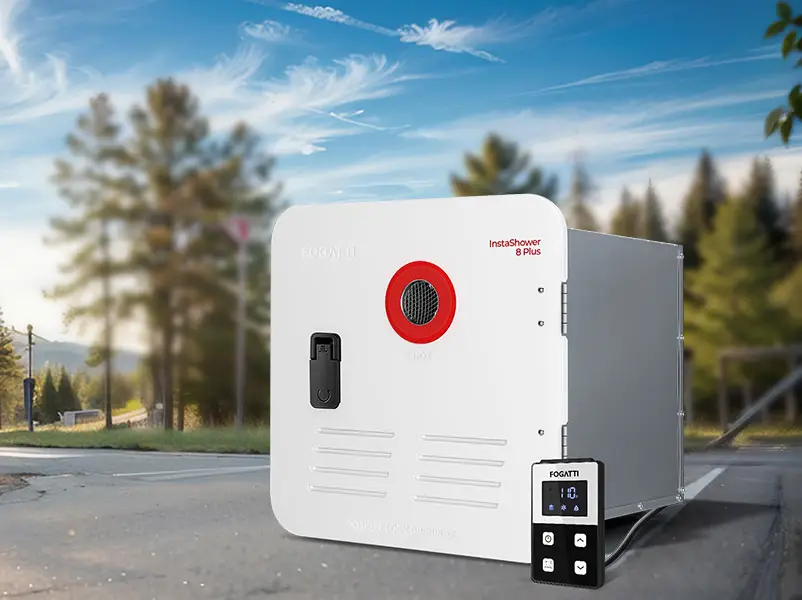
The Guide to Selecting, Installing, and Maximizing RV Water Heaters
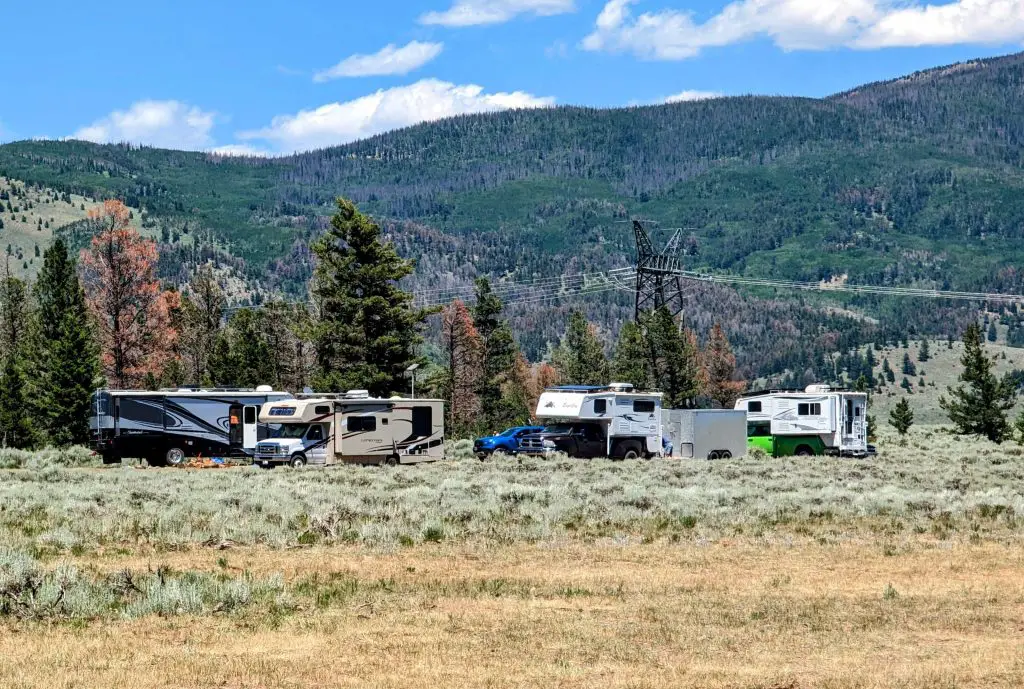
Live In A Camper Full-Time – Everything You Need To Know Before You Make The Move
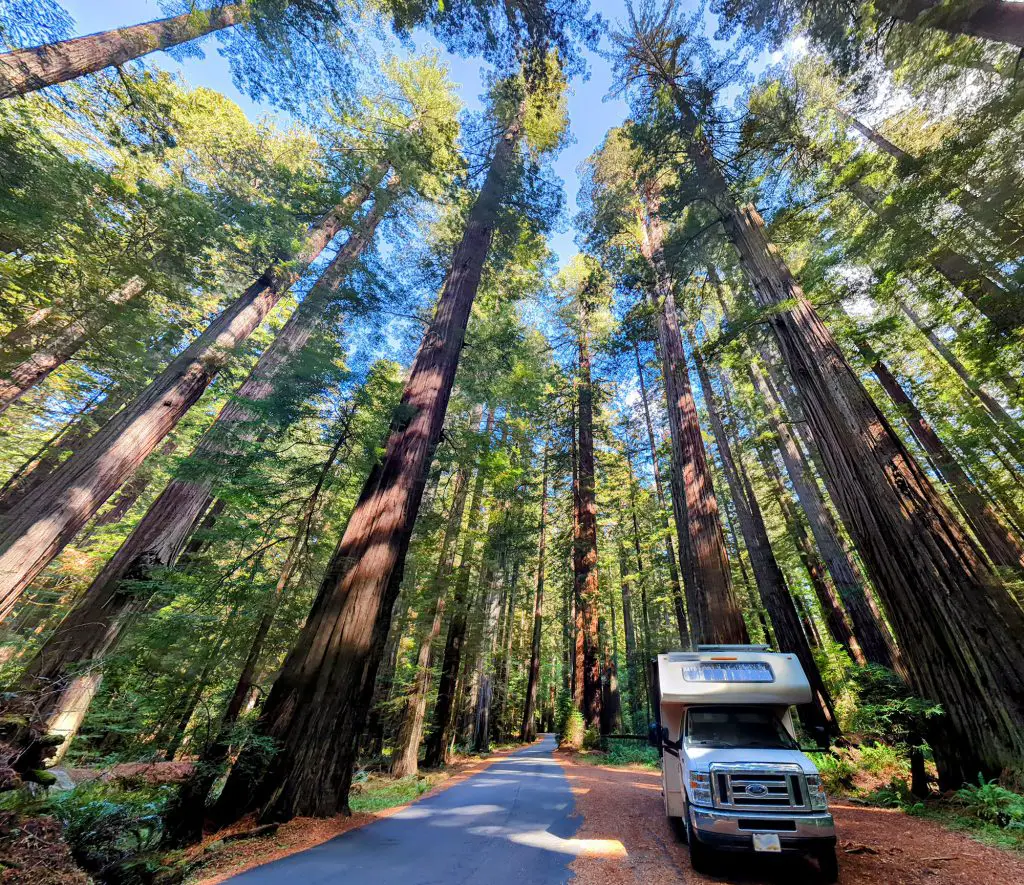
How Much Does It Really Cost to Live in an RV?
Leave a comment cancel reply.
Your email address will not be published. Required fields are marked *

No, thanks!

How to RV Overnight at Rest Areas: The Rules and The Real Scoop
Rest areas have come a long way since the first interstate “safety areas” opened in 1956 when travelers were offered a quick place to stretch, run into a usually unkempt two-stall bathroom with a dim overhead light. these rest-stops inspired a string of horror movies for thirty years and along with them, a legitimate fear of stopping at one–let alone sleeping. but, as transportation budgets tightened, the old rest-areas have slowly disappeared and in their place are new, safer, bigger rest areas with a variety of services designed to attract travelers. these are ideal places to stretch, nap or stay overnight in your rv. rules vary from state-to-state, but read on and i’ll share how to overnight at rest areas: the rules and the real scoop .
Rest areas vary, let’s start there. There are still some relics out there, but many of those are being closed down to save money as truck stops, restaurants and motels have been built along major interstates. Many states have drastically reduced the number of rest areas, and some (like Connecticut) have proposed doing away with them all together.
This may all seem like bad news for the RV traveler, hoping for a place to rest, but don’t despair! Shiny, new rest areas and Visitor Centers have sprung up in their place. These new rest areas offer bigger bathrooms, pretty outdoor areas, a place to walk your dog, and sometimes get a snack (vending revenue has contributed to their construction). Now, parking spaces are long, lighting is bright, and fellow-travelers are abundant.

As for the Rules and The Real Scoop, let’s start here:
What St ates Allow Overnight Parking at Rest Areas?
Like many Travel Bloggers out there, I thought there were specific states that allowed Overnight Parking at Rest Areas — I was wrong.
Yes, there are some States that have straightforward rules, like Texas and California, but if you travel through these States or research individual Rest Areas in those States, you quickly find that each location’s rules can vary. So, it’s kind of misleading to suggest there are entire geographies under one specific set of rules. Some of those states that “allow” overnight parking have sites that restrict hours and other states that “don’t allow” overnight parking have sites that allow 12 hours, for example. Remember: Rest Areas are meant to keep the interstate highways safe, so rules will vary based on the need of that corridor and the budget of the local administration.
So how can you find out? Check with each State’s Department of Transportation. Here’s a comprehensive list:

- Connecticut
- Massachusetts
- Mississippi
- New Hampshire
- North Carolina
- North Dakota
- Pennsylvania
- Rhode Island
- South Carolina
- South Dakota
- Washington State
- West Virginia
Remember: most states have rest areas that don’t allow overnight parking or have restrictions. Conversely, there are other states, not on this list, that have rest areas that do allow overnight parking! Confusing, right? No worries. Here are tips to help you navigate to a rest area that’s right for you.
3 Tips to Finding RV Friendly Overnight Rest Areas
- Do your research. As always, check out your favorite app like Allstays , RVParky , or FreeCampsites.net to find reviews on rest areas along your route. If another traveler leaves a bad review, I move on. In addition, I recommend checking this interactive link: The Google Map of Rest Areas . This site shows you all U.S. rest areas and tells you what services they offer (like free water and dumpsites!).
- Read the Signs! Even if a state normally allows overnight travelers, some individual rest areas still don’t. If you see a sign that strictly prohibits Overnight Parking, my advice is don’t sleep there. These rest areas are usually busy or have had problems with safety in the past. Normally, rest areas have a generic sign that reads “no camping”, which is fine. Use Google Earth to see a virtual view of the lot and the signs before you go!
- Be Safe . If you feel creeped out: leave. If you see nefarious activity: leave. If you don’t see a well-lit, busy space with other overnighters: leave. A truck stop or friendly retailer might be just down the road.
- Call the Department of Transportation for the State your visiting (numbers can be found through the State links above).
- Look for Truckers . Truck drivers are required to sleep so many hours a day, so there must be places for them to pull over and sleep. If they can, you can. Just don’t take a truckers spot.
- Search for a specific States “Rest Area Brochure PDF” see below…
Now, the Real Scoop on Staying Overnight
Rest areas are usually not monitored; I’ve never seen a dude with a clipboard tracking what time vehicles go in and out. This is great for staying overnight, but not so great for safety. So, like Tip #3 above, pick a rest area in which you feel safe. If you do, it is unlikely you will get the dreaded 3a.m.-knock-on-the-door telling you to move on. If other travelers and truckers are staying overnight, you will likely be just fine.
Even if a state doesn’t expressly condone staying overnight, if you search exhaustively (like I do), you can find rarely-seen State Rest Area Information like this one from Wyoming:

This excerpt pretty-much sums up what I’ve found in my research. States don’t want people “camping” at rest areas, or living there. They do , however, want to keep their highways safe. If that means allowing people to rest (aka sleep ) until they can safely travel, it’s allowed.
Of course, fellow travelers, don’t be loud, drop trash, put out your slides or anything else that draws attention to you. My advice is to pull your blinds and actually sleep so you can move on to a more beautiful and permanent spot to camp!
Want to see my YouTube video on this topic? Click HERE.
Thank you for reading! Please, like, share and subscribe if you find this site helpful.
Be Happy. Create More. Set Yourself Free .
Subscribe to Blog via Email
Enter your email address to subscribe to this blog and receive notifications of new posts by email.
Email Address

This site is supported 100% as an Amazon Affiliate. Please, navigate to Amazon through this link to do your shopping. It doesn’t cost you a thing. Thanks, and check out my must-have RV gear recommendations here!
Share this:.
- Click to share on Twitter (Opens in new window)
- Click to share on Facebook (Opens in new window)
- WORK FROM HOME
- The Best RV Gear!
- How to’s
- Life on the Road
- Nomad Interviews
- SAY THANKS!
- Jackery Power Station Comparison Chart
- Power Station Comparison Chart
- 5-Year RV Value Comparison Tool
- Remote Jobs! 15 Gems You Must Not Miss
- Electric Bike Comparison
- Personal Locator Beacon Comparison
- Meet Our Partners
Can You Sleep at a Rest Stop? A Guide to Overnight RV Parking
Long road trips call for ample amounts of rest. Coming across a rest stop on your journey may seem like the obvious answer when planning where to spend the night. After all, it is the most affordable option, and it’s right there (no hotel reservation required).
However, depending on what state you are traveling through, you could be out of luck– as some rest stops don’t permit overnight parking. These rest stops are only intended to be rest areas for drivers needing a few hours of shut-eye (not a full eight hours).
If you are traveling in your car or RV and heading out on a long trip, we will answer all your questions before you pull into a rest stop –only to have to turn around.
Can You Sleep at a Rest Stop?
Sleeping overnight at a rest stop in an RV or a vehicle is permitted in some states, but regulations and parking time limits are typically set. For example, California allows up to eight hours of rest time, whereas Colorado and Virginia prohibit overnight parking at rest stops entirely.
How Neighbor is changing RV storage
Transparent monthly savings.
Renters save 30-50% on RV storage, on average. No rate hikes.
Keep your RV nearby
25,000 locations means that your RV is always close by.
Storage made simple
Don't settle for stone age tech and long contracts. Neighbor makes it easy.
States That Allow Sleeping Overnight in Rest Stops
The majority of states allow drivers to sleep overnight at rest stops . However, it is imperative that you check local restrictions or any signs posted at the rest stop. There are almost always time limits of one night or 8-12 hours.
- California: Drivers are subject to an 8-hour limit within any 24-hour period.
- Connecticut
- Delaware: Limited to 8 hours at Route 13 rest area; I-95 Welcome Center allows overnight stays.
- Idaho: 10-hour limit on interstates; 16-hour limit on state highways.
- Iowa : Drivers are allowed to park overnight for less than 24 hours.
- Kansas: Drivers must abide by the 24-hour limit; many rest areas have RV loops.
- Minnesota: Drivers are subject to a 4-hour limit for rest areas; overnight parking is only allowed at travel information centers.
- Mississippi: Drivers are permitted to rest for an 8-hour continuous period limit.
- New Hampshire
- North Dakota
- Oregon: Drivers are restricted to a 12-hour limit within any 24-hour period.
- Pennsylvania : 2-hour limit at rest areas; 24-hour limit at service plazas on the turnpike.
- South Dakota
- Utah : Allowed with some restrictions; no camping.
- Washington : 8-hour limit within any 24-hour period.
- West Virginia : Overnight parking is permitted in the areas designated areas for RVs at travel plazas.
Even though these states permit overnight parking at rest stops, it is vital to know the specific rules and limitations in each location.
States with Restrictions on Overnight Parking
Certain states enforce more stringent rules regarding overnight parking at rest stops . For instance, the following states prohibit overnight parking in rest areas:
- Florida: 3-hour stay limit.
- Illinois : 3-hour stay limit.
- North Carolina
- South Carolina
Additionally, some states completely ban sleeping at rest areas to prevent misuse and ensure safety. Remember that camping (i.e., setting up outdoor amenities) is usually prohibited even in states that allow overnight parking.
This distinction helps manage the rest area’s resources (electricity, water, etc.) and maintains a steady flow of traffic so that campers don’t hog the rest area’s limited parking spaces.
Remember: overnight camping and resting overnight are really two different things.
Understanding Overnight Parking vs. Camping
One of the first things to understand is the difference between overnight parking and camping. Overnight parking entails staying inside your vehicle without setting up any outdoor amenities . This means no chairs, tables, grills, or tents should be outside your vehicle.
You’re simply using the parking space to get some rest before continuing your journey.
Camping, on the other hand, is a more elaborate setup. When you camp, you might:
- Level your RV
- Set up a grill
- Put out lawn chairs
- Extend awnings
- Set up the portable generator to charge batteries
Essentially, camping in a rest area means you’re turning the spot into a temporary home. Therefore, you need amenities that go beyond just parking for the night. This activity is generally prohibited at most rest stops.
Save up to $1,200/year on RV storage & parking
Common questions about sleeping at rest stops.
Even when you know a state allows you to stay overnight in your car or RV, you may want to clarify what you’re permitted to do in these parking spaces.
The biggest concern for most RV travelers is legality . As long as you follow time and location restrictions, most states allow you to sleep for one night. Just look for signs posted in and around the rest area building, and you can also check the website of the rest stop if there is one.
Ultimately, the amount of time you can sleep in a rest area varies depending on that particular location’s specific rules and regulations. Most do not allow extended stays.
Another concern travelers have is safety. Many RVers report that sleeping overnight at rest stops is generally safe, but it’s important to trust your instincts. If a location feels unsafe, it’s best to move on to the next rest area or find an alternative place to park.
Overnight parking at rest areas serves an important purpose by helping to keep drowsy drivers off the road. Drowsy driving is a significant risk factor, accounting for about 100,000 crashes each year.
How to Find Suitable Rest Stops for Overnight Parking
Most rest stops have signs posted that indicate whether sleeping is permitted . These signs are typically easy to spot and provide clear guidance on the rest area’s policies.
When planning in detail or spending extended periods on the road, tools like Roadtrippers Premium can be worth the money. This app and website allow you to locate rest areas and other locations that accommodate RVs for overnight stays.
Welcome centers , visitor centers , and service plazas can be good overnight parking options. The great thing about these locations is they often have on-site staff who are ready to help you if you are a tired driver.
Another option to consider is highway rest stops , also known as truck stops (different than a traditional rest stop). These locations are generally open 24 hours a day and offer facilities like showers, food, and fuel.
However, be mindful of the spaces reserved for truckers, as they have strict regulations on their rest periods and need these areas more than RV or car travelers.
Best Practices for Overnight Parking at Rest Stops
Once you know you can park overnight, here are some other things to keep in mind.
- Choose a rest area with good lighting and 24-hour security if possible
- Avoid spots that are reserved for truck drivers
- Use Reflectix in your windows to block out light
- Bring earplugs or a white noise machine to drown out any remaining sounds. However, you won’t want to block out 100% of the noise for safety reasons.
- Staying hitched and keeping all slide-ins in place is also wise, as it allows for a quicker departure in an emergency situation.
When you have made your way back home, you’ll need a place to store your RV or travel vehicle.
If you don’t have the space or the proper accommodations at your home, consider Neighbor. Neighbor is a peer-to-peer RV and vehicle storage marketplace where you can store your RV in your very own neighborhood. Bonus: Neighbor hosts are pre-screened and offer RV storage that’s up to 50% cheaper than traditional options.
Frequently Asked Questions
Can you sleep at rest stops in the us.
In the US, staying overnight to sleep at a rest stop is legal in most states. However, check local restrictions before sleeping in a parking area.
Can You Stay Overnight in CA at Rest Stops?
California rest stops allow for up to 8 hours of parking at a time.
Is It Okay to Sleep at Truck Stops?
Some truck stops allow parking by vehicles and RVs but only in designated areas.
Can you sleep in Virginia rest areas?
No , Virginia rest areas do not allow sleeping.
Is It Illegal to Sleep in Your Car USA?
In some states, sleeping in your car is illegal. However, most rest areas do allow sleeping in cars or RVs , but you must check local regulations and signs.
Related Posts
- Boat Ownership
Can I Park My Boat in My Driveway? A State-by-State Guide
Can i park my rv in my driveway a state-by-state overview, ultimate guide to stress-free overnight rv parking spots.
- Personal Cars
How Long Can a Car Be Parked on Residential Street?
- Boat Storage
Can You Park a Boat on the Street? A Guide to Rules and Regulations
- RV Ownership
Understanding U.S. RV Laws in 2023

Justin earns $650/mo on Neighbor. Find out how you can too!
Stay in the loop ↓
The Wandering RV
Safe overnight rv parking: how to find safe, legal places to rest.
- Bill Widmer
- Updated: June 12, 2023
Sponsors help keep our quality content free!
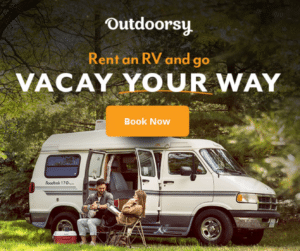
One of the challenges of RVing is finding safe, legal overnight parking spots to rest and take a break during long road trips.
Some RVers will tell you that booking a campsite or RV park months ahead of time is best—if you plan on staying in a highly popular spot, that’s usually sound advice.
But sometimes you just want to find a quick place to lay your head in between destinations. You don’t want to plan every single stop on your route. And you want beautiful, free camping!
So how do you find free RV parking on a whim? Well, let me tell you how!
Table of Contents
Walmart parking lot.
- Cracker Barrel
Urban Stealth Camping
Don’ts, campgrounds & rv resorts, national parks, state parks, camping discount memberships, websites & apps to find free overnight parking, frequently asked questions, a note on rv insurance.
Safe & Free Overnight RV Parking Options
When all you want is a spot to park overnight and rest for a few hours, exclusive campsite charges hurt even more. There are secure areas to camp for free all around the country—if you know where to look. In fact, knowing where you can park overnight for free is an essential skill for any RV-er or van life-er.
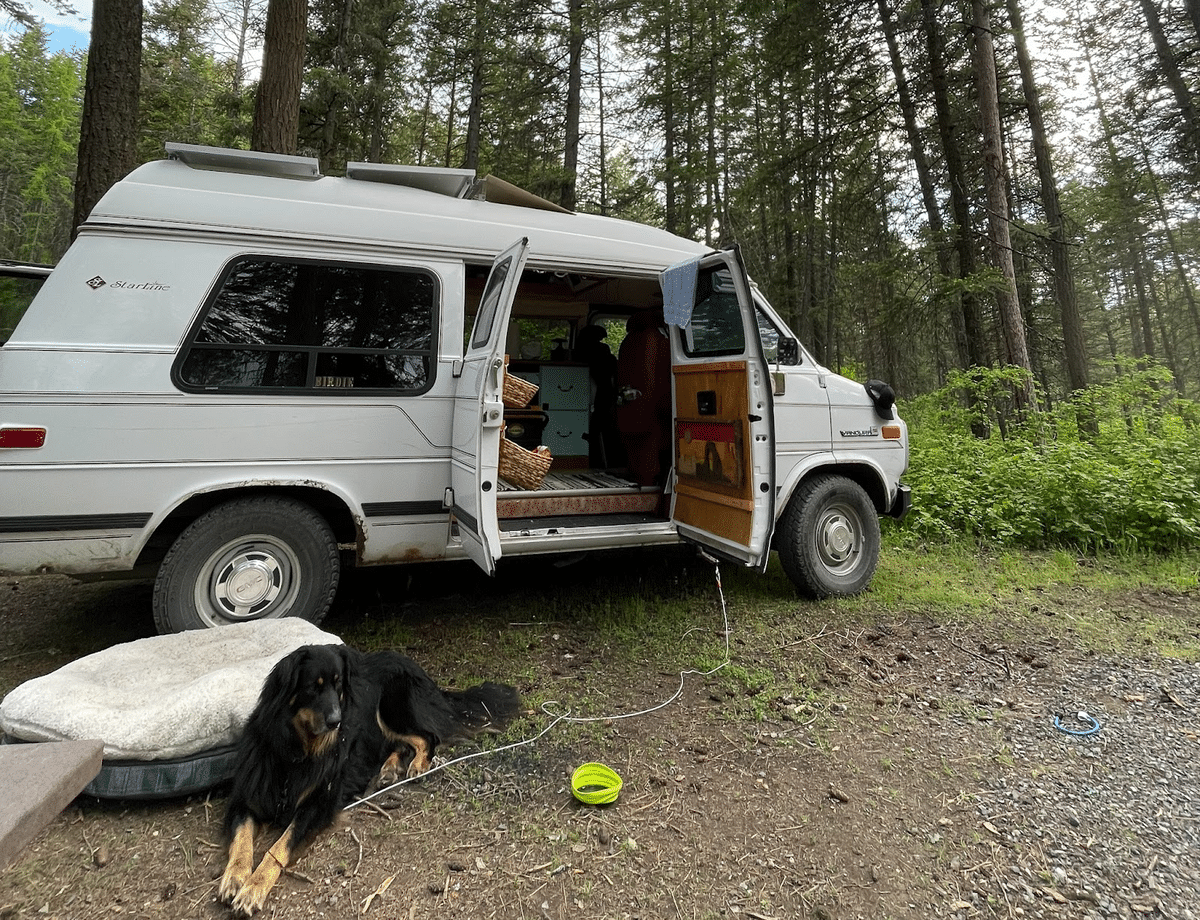
For details on how to park and where to find BLM property, see the Bureau of Land Management (BLM) or National Forest websites. Depending on the type of property and the restrictions that apply, it’s pretty common to be able to stay in one of these locations for up to 2 weeks.
BLM lands are owned by the Federal Government and many of them allow free RV parking. These scattered camping places are particularly common in the Southwest. Many BLM lands are located in beautiful regions, so you may end up staying longer than you anticipated!
Although there are usually no showers or power hookups (which means you’ll be boondocking ), these places are often calm, tranquil & breathtaking. They are my personal favorite spot to spend a night (or a few!).
Business Parking Lots
There are a lot of businesses that have parking lots that become vacant overnight. Try listing privately-owned businesses like departmental stores, large furniture marts, supermarkets, or cinemas.
If you arrive at the location at a decent time, you can try walking into the store and asking for permission. You can also try calling them in advance and asking if they allow overnight RV parking.
Here are some of the common business parking lots which allow free overnight RV parking:
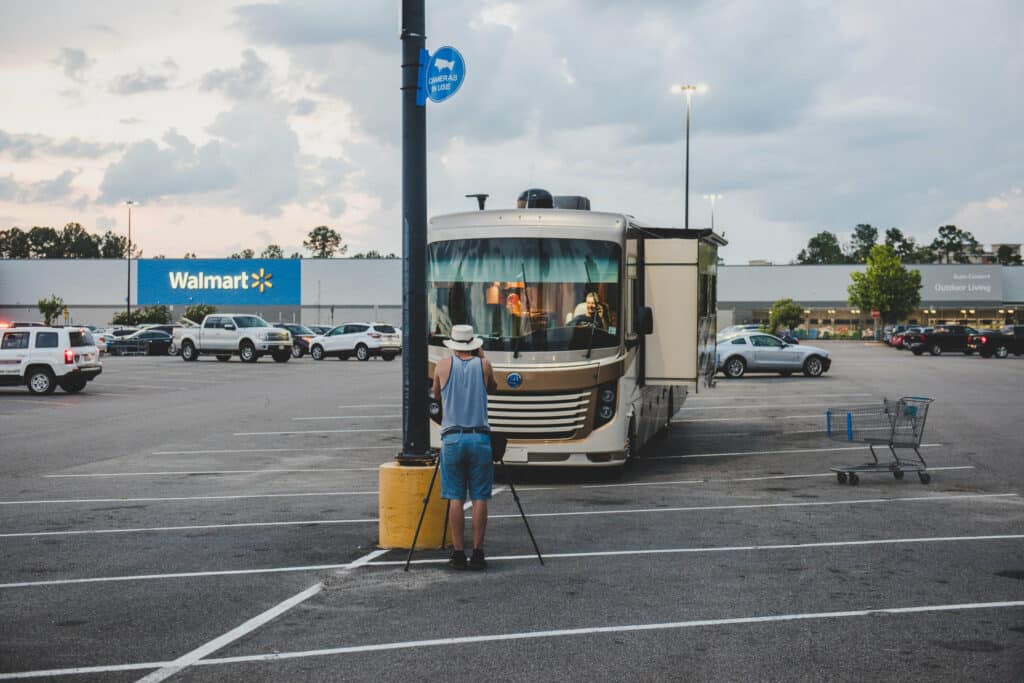
The Walmart parking lot seems to be an old reliable for free RV overnight parking. While they are a good option, it is generally loud and brilliantly lit throughout the night. However, Walmart parking lots are usually secure and offer abundant parking spaces. Another pro about parking at Walmart is that you can stock up on food, groceries, or any other time you may require for the road.
Cracker Barrel
Most Cracker Barrels are RV-friendly, with specific free RV parking areas and 24-hour supervision, which can be particularly appealing to women traveling alone . While not as common as Walmarts, a Cracker Barrel does not ask you to ‘check in’ or phone anybody before staying there.
Most casinos also offer free overnight parking. Some may charge a nominal fee if a significant event, such as a concert or comedy performance, is taking place. However, it would be best to exercise caution in terms of security because such locations can attract shady individuals.
We stayed in some really nice Cabela’s parking lots before. They often have added benefits like a pet area and potable water, which is always helpful!
Regardless of the business you choose, try to be respectful, remain no longer than a night or two, and avoid littering around the place. It’s worth noting, though, that this guideline does not apply to all privately owned businesses, so it is advisable to call and check. Out of Walmart’s 4000 retail locations in the US, 3000 allow free overnight RV parking.
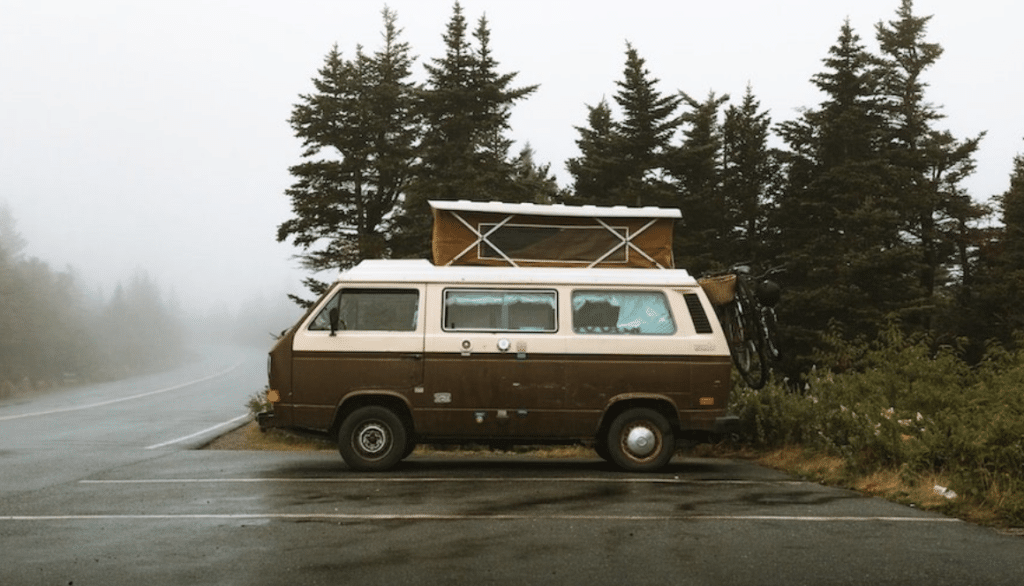
Camping without being noticed is known as stealth camping . The secret is to arrive late at the area and leave early the following day to avoid being spotted. You also don’t want to leave any evidence that you were present. You may also achieve this by sleeping (and living) in areas that aren’t the traditional ones that your neighbors would anticipate.
Stealth camping is done for two reasons mainly:
- Full-time van dwellers whose presence isn’t always welcomed in larger cities and towns, so stealth camping enables them to blend in.
- Travelers who choose to be more discreet in cities and the outdoors have more privacy and protection.
Just be wary of local laws. In some cities, such as Olympia, WA, allow people to sleep in their campers on the street. In others, it is considered illegal or unlawful and you can get asked to move, or worse.
When traveling, you will always notice rest stops on the way. Search ahead of time to find out which rest areas have parking lots that you can utilize. Some parking lots allow overnight parking, while others do not. Even if they don’t, you can probably pull in and rest for a good few hours in an urgent situation.
Rest stops are usually well lit, and you will also get access to bathrooms. One disadvantage, however, is that you probably won’t find these areas equipped with good surveillance. If you feel unsafe or iffy, it may be better to leave.
Free RV Parking Do’s & Don’ts
A lot of places give access to RVs for free parking. Using the facility, especially if it is free of cost, mandates certain behavioral rules you must follow.
- Park in residential spots
- Keep the blinds down
- Leave no trace
You can park in residential neighborhoods because they are usually quiet and secure. The only issue is how welcoming the neighborhood is—there is a chance they will get suspicious and call the cops on you.
Keep your blinds drawn to avoid attracting unnecessary attention to yourself. If you want them up, park in a well-lit space that doesn’t make your RV look like a beaming star from afar.
Regardless of how safe you think your parking area is, you must always stay alert and conscious of any background noise or movement around your vehicle.
Read our RV safety tips for more info.
- Do not park near schools
- Do not become a nuisance
- Do not overstay
- Do not litter
Park away from schools and playgrounds. You may be aware that you are not planning anything nefarious. Others, however, are unaware of this, and parents are understandably concerned about their children’s safety.
Do not abuse the facility you have been provided with, and be wary of the environment and the people that reside around you. Avoid causing a commotion by using a generator late at night, playing loud music, or leaving your litter behind.
Whether or not someone asks you to leave, it is good practice to not stay longer than necessary.
Other Overnight RV Parking Options
Now that you have gone over the free overnight RV parking locations, here are some other overnight RV parking options you can pay for. You might not find space or permission to park freely, and in such cases, it is good to know backups, even if they come at a cost!
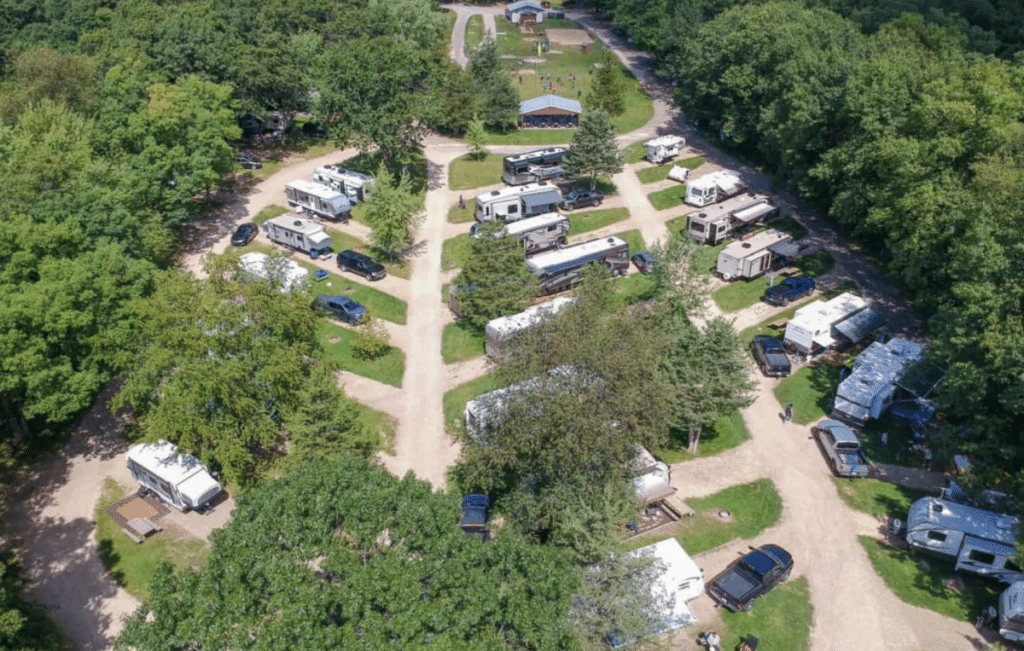
You can expect a few more amenities than you would find at most free RV parks when you pay to stay at a campground. They often include cable TV, free wifi, a clubhouse with showers, coin laundry machines, and other amenities. Resort RV sites are often spacious, and some of them also provide bus services to local attractions.
Check out our list of the 98 best luxury RV resorts, parks & campgrounds in America here .
This is especially enjoyable for nature lovers who want to spend the night in a peaceful setting surrounded by national forests. National park campgrounds like Yosemite National Park or Grand Canyon National Park are often larger and more scenic than commercially run campgrounds. However, they usually fill up early throughout the summer, often months ahead of time, especially during weekends.
Check out some of our National Park guides:
- Glacier National Park
- Theodore Roosevelt National Park
- Acadia National Park
Apart from the ownership structure and possible regulatory differences, state parks are not much different from national parks. It is recommended to check which state parks allow RV parking and what laws, if any, you would have to adhere to.
- Escapees RV Club
- Thousand Trails
- Passport America
The Escapees RV Club is more than simply a camping club. Their membership benefits include not just savings but also other support services such as RV training seminars. They have seven Escapees Park sites and have worked with 1,000 other commercial parks to provide savings to their members.
Thousand Trails is the second RV campsite membership on our list. Because of its “zone passes,” it is best for people who want to move around a lot. Members may buy a pass for one of their five zones and get admission to all of the campsites in that zone for one low price.
Passport America is another excellent RV campsite membership. With over 1,800 campsites participating, this organization provides members up to 50% off camping expenses.
You can surf the following websites and download the applications to find free overnight parking:
- The Dyrt (Use code “TWRV” for a 30-day free trial!)
- Couch Surfing
- Overnight RV Parking
The Dyrt is a great way to find free and paid camping. If you sign up for their PRO membership (free for 30 days with code “TWRV”), you also get access to public land maps (BLM, National Forest, etc.), 10-40% off campgrounds, and even cell service maps to see whether or not a given area will have service!
Hipcamp is a terrific method to uncover unique camp locations such as vineyards, ranches, and beaches that aren’t mentioned anywhere else. On the other hand, Couchsurfing connects you with people all over the world who are ready to open their homes to travelers, guide them around town, or even give them space to park in.
Togo RV’s Overnight RV Parking is a subscription service app that utilizes your GPS to locate free parking near you and connects with various map applications to offer comprehensive driving directions. RV Parky is another guiding app that lets you identify suitable locations by narrowing them down using parameters such as electrical hookups. This, however, is free.
T here are a plethora of options available. Overnight parking is usually available at 24 Hour Fitness, Anytime Fitness, Cracker Barrel, Camping World, Cabela’s, Home Depot, Costco, Sam’s Club, and Walmart.
However, this is not set in stone. These stores have multiple branches, and overnight parking may be prohibited at certain shop locations depending upon the laws of that area. Always ask for permission before staying anywhere.
RV campsites typically cost between $25 to $80 a night, based on the area, size of the place, and amenities available. You may be able to use national and state parks’ parking lots for a fee of less than $20; however, that again depends on various factors. That being said, there are options like rest stops, churches, casinos, and stores that allow free RV parking!
You cannot pull over just anywhere and sleep. Some cities and towns allow free overnight RV parking on the street and others do not. In general, it’s always best to get permission before you stay anywhere overnight.
An RV insurance coverage protects you financially in the case of accidents, injuries, or other unforeseen circumstances. This covers things like repairs, hospital fees, and liability coverage if you hurt somebody or harm their property.
Whether you intend to live in your RV full-time or only use it for frequent excursions, you must ensure it. Companies like Good Sam, National General, and Roamly are good RV insurance companies to try.
Campers for Rent | Get a Camper Rental From Outdoorsy
The best off-road campers under 5,000 lbs: for the adventure-ready traveler, rv extended warranties in 2024 — are they worth it everything you need to know, the wandering rv product review: venustas heated gloves.
These help keep our quality content free!

Our Sponsors
Thanks for reading! Make sure to check our some of our sponsors below, all revenue we get is used to produce quality content for fans of the RV lifestyle like you!

Keep Reading
Related article.
Looking for campers for rent and want the best deal? We’ve got your back. Camper rentals are a perfect way to experience new areas for
Are you ready to ditch the pavement and explore the wild unknown? Whether you’re cruising in a Toyota Tacoma, a 4-Runner, or another adventure-ready rig,
RV Warranties… the part of RVing no traveler wants to think about. It’s protection for the worst-case scenarios, and serves only as peace-of-mind in the
RV Rentals by Type
Sign up for our newsletter.
How to Find Overnight RV Parking
When you’re on a multi-day RV haul, bouts of rest are often necessary. If sleep is your objective, rather than a full camping experience, paying for a site in an RV park might not be warranted.
Overnight RV parking can be the solution for resting between drives. There are a plethora of legal, welcoming options for overnight stays in an RV across the U.S. and Canada—most of them free.
In This Article
How to find safe overnight rv parking, locations that typically allow overnight rv parking.
- The Dos and Don’ts of Overnight RV Parking
- What to Expect When Overnight RV Parking in Parking Lots
Common Questions About Overnight RV Parking
The Roadtrippers app can help you find safe overnight RV parking . It’s important to use a resource, like Roadtrippers, that vets and allows feedback on the locations listed. A moderated app or website will help you choose a safe location and avoid late-night knocks from law enforcement or management.
Utilize websites and apps that verify the legality and permission of listed overnight RV parking locations. It’s also important that these resources stay up to date and respond to reports of changes in overnighting policies.
The following websites and apps have active moderation to determine the accuracy, availability, and legality of their overnight RV parking listings.

Overnight RV Parking by Roadtrippers
Roadtrippers Premium members have access to overnight RV parking locations, providing an accurate and authoritative database of free overnight RV parking locations in the U.S. and Canada. Not only can you see where overnight RV parking is welcomed, you can read reviews and reports from other RVers who have overnighted at the location.
Campendium is a review-based website and app for reviewing RV camping and overnighting opportunities. These includes parking, boondocking , RV parks, campgrounds, and multi-night camping options.
While Campendium is free to use, Roadtrippers premium members enjoy an ad-free experience. And if you’d prefer an all-in-one experience, Campendium campsites and reviews are all in Roadtrippers too!
Harvest Hosts
Harvests Hosts is a network of breweries, wineries, farms, and other small business locations that invite self-contained RVs to stay overnight at no fee beyond the cost of a yearly membership (however, guests are expected to patronize the business). Harvest Hosts can be used in website and app forms.
Boondockers Welcome
Boondockers Welcome offers self-contained RVs the opportunity to park on a host’s private property in the U.S. and Canada. Boondockers Welcome is an app and a website with a yearly fee that allows you to locate potential hosts offering their property up for a night of rest at no additional cost.
While you should never assume that a location permits overnight RV parking, some places are more likely than others to be a viable option. When looking to make a quick overnight stop in your RV, you’ll most likely end up at one of the following types of businesses.
It’s always best practice to get permission from a business or confirm legality with the local municipality if it’s not obvious that overnight RV parking is permitted.
Overnight RV Parking at Businesses
Places of business with large parking lots and reduced overnight patronage are often permissive of RVs parking overnight at no cost. Oftentimes, this practice is regulated by the city or town, so be aware that some chain stores that often permit overnighting may not be able to in certain areas.
Always pay attention to signage permitting or prohibiting overnight parking, and confirm permission by contacting staff or management if you’re unsure.
Overnight RV Parking at Big Box Stores
Big box stores are a common and well-known option for free overnight RV parking. Walmart is a popular option, with many locations permitting overnight RV parking as long as both local ordinances and store management approve of the practice.
Other common retailers that often allow overnight RV parking include Bass Pro Shops, Cabela’s, Camping World, Costco, Kmart, Lowe’s, Menards, Sam’s Club, and The Home Depot.
Overnight RV Parking at Casinos
Many casinos welcome casino patrons to spend the night in an RV in the parking lot. While usually free, RV overnighters are typically required to check in with security. It’s not atypical that overnighters are asked to sign up for a player’s card or otherwise patronize the casino in return for the use of the parking lot.
Some casinos host an RV park or have RV hookups on the property, but will sometimes still allow parking overnight in a lot for free.
Related The Ultimate Guide to Casino Camping in the United States
Overnight RV Parking at Restaurants
Cracker Barrel is the most RV-friendly restaurant chain in the U.S. Most Cracker Barrels permit RVs to spend a night in their lot and have designated pull-through RV parking spaces.
Mom-and-pop style restaurants may also be options for overnight RV parking. If you enjoyed dinner at a restaurant and find yourself ready for a night of sleep, it never hurts to ask the manager.
Overnight RV Parking at Rest Areas and Truck Stops
Rest areas and truck stops are conveniently placed, highly-accessible locations for overnight RV parking. Typically located adjacent to major thoroughfares, these locations are built to accommodate even the largest of rigs.
Don’t assume, however, that overnight RV parking is permitted at all truck stops or rest areas. Some states prohibit the practice or limit the time you can park. Some truck stops reserve overnight parking areas for professional truckers only. Be sure to check the rules of a location before arrival or have a backup plan in case you arrive and find out that overnight RV parking isn’t allowed.
Related Can You Sleep at Rest Stops? All About Overnighting in Rest Areas
Overnight RV Parking in Urban Areas
In some locales, it’s legal to park your RV on a public street and sleep in it. On rare occasions, free or paid public parking lots permit the practice. Permissibility is highly dependent on local laws and ordinances. Accessibility is often limited to smaller rigs.
When scouting streetside overnight RV parking, pay attention to posted signage and research local laws.
Perception of safety is subjective, and you may not know if an area feels safe until you arrive. Parking in well-lit areas is good practice.
When parking overnight in an urban area, be hyper cognizant of your presence. Urban areas aren’t the place to put leveling jacks down or utilize generators. Any disturbance to the local community is likely to lead to a knock on the door asking you to leave.

Overnight RV Parking at Non-Traditional Locations
Across both the U.S. and Canada, you can find non-traditional overnighting locations. Some cities or towns have constructed roadside parks to accommodate weary travelers passing through. Some city or county parks permit overnight parking, often for free, but sometimes for a small fee.
Museums and roadside attractions occasionally offer RVs the privilege of overnighting in their parking lots, especially after patronizing the location. So do some convention centers with large parking lots. Visitor centers, especially in smaller towns and cities, may be able to accommodate an RV looking to park overnight.
The best way to find these types of locations is through Overnight RV Parking in the Roadtrippers app.
A call to the local visitor center to ask about safe places to park overnight never hurts. Sometimes you may be directed to a local business or given special permission to park in a location where overnighting is not widely permitted.
The Dos and Don’ts of Overnight RV Parking
Overnight RV parking is just that—parking your RV overnight so that you can meet basic needs like sleeping and eating. Overnight RV parking is not camping.
Camping in an RV involves setting your rig up to enjoy time in a location. This means extending RV awnings and arranging your outdoor setup with carpets, lawn furniture, and BBQ grills.
Overnight parking in an RV means utilizing a parking space or area to shut off your engine and stagnate. No awnings or camping gear should be deployed. Consider refraining from the use of levelers and slide-outs if possible, and always refrain from use if either is destructive or inhibits the movement of others.
In general, if your RV looks like you’re camping, you’re camping. If your RV looks like you’ve just parked it for a short time, you’re parking.
To support sustainable overnight RV parking, RV consumer clubs created the “RVer’s Good Neighbor Policy.” Consider the suggestions below:
- Stay one night only.
- Obtain permission from a qualified individual.
- Obey posted regulations.
- No awnings, chairs, or barbecue grills.
- Do not use hydraulic jacks on soft surfaces (including asphalt).
- Always leave an area cleaner than you found it.
- When feasible, purchase gas, food, or supplies as a form of thank you.
- Be safe. Always be aware of your surroundings and leave if you feel unsafe.
When parking your RV overnight, also consider the following:
DO park your rig in a position and location that permits an easy exit in the morning. Consider possible obstructions, including being parked in, when settling on an overnight location.
DO look for and respect any posted signage.
DO park in a space that’s appropriate to the size of your RV. If you have a small RV, don’t utilize a parking spot designed for a large rig (i.e. tractor trailer) if at all possible.
DO arrive late and leave early, if possible.
DON’T park in a manner that could impede auto or pedestrian traffic.
DON’T run a generator if the noise could disturb the peace of the local environment or your neighbors.
DON’T fill an overnight parking location’s trash cans with your household refuse.
DON’T assume you can park and leave the property. While it’s good practice to patronize a business at the overnighting location, don’t use a location that doesn’t permit camping as a camping area for day exploration.
What to Expect When Overnight RV Parking in Parking Lots
Overnighting in a parking lot is typically free and often convenient. You should, however, set expectations prior to arrival. Your experience will vary, and conditions at parking lots are known to fluctuate.
Many parking lots, even throughout the night, are busy places. This is especially true for lots that attract and permit commercial trucks. Be prepared to open your blinds in the morning to a different scene than when you closed them.
Parking lots can be loud. With cars and trucks coming and going throughout the day and night and people patronizing 24-hour businesses, you should expect noise. In addition, if you’re parked near tractor trailers, you may find yourself subjected to other mechanical noises.
Don’t expect dark skies while overnighting in a parking lot. Most lots keep the lights on all night long for safety.
Expect few to no amenities, especially in terms of hookups or waste disposal.
Parking lots aren’t scenic locations. While the hubbub of people coming and going can be interesting, parking lots rarely provide the natural ambiance many associate with RVing.
Simply expect a place to park your rig so you can refuel, shower, and sleep to prepare for more driving.
There are plenty of welcoming and safe locations to park an RV overnight. Rest areas, truck stops, big box stores, casinos, and sometimes city parks or visitor centers are all types of locations that may permit overnight RV parking. Of course, you can always book a night at an RV park or campground—many of which are conveniently located right off the highway and provide hookups. Roadtrippers is a useful tools for finding a place to park your RV overnight.
Most places that explicitly permit overnight RV parking are also relatively safe. You can increase safety by overnighting in locations that others use for the same purpose and by reading reviews from previous overnighters (available through Roadtrippers). Other overnight RV parking safety tips include parking in well-lit areas in view of security cameras and parking in a manner that allows you to quickly and easily drive away when needed or desired.
Some private businesses such as casinos and big box stores permit overnight RV parking in their parking lots. Some cities or municipalities permit overnight parking in specific locations. Many rest areas permit RV parking with a limit on how many hours you can stay. Most truck stops permit overnight RV parking in designated areas.
Rest areas, truck stops, big box stores like Walmart and Bass Pro Shops, casinos, and sometimes city parks and visitor centers are all locations that may permit free overnight RV parking. Roadtrippers is a useful tool for finding a free place to park your RV overnight.
Overnight RV parking prices can range from free (common) to a few dollars (on occasion) to more (rare). Rest areas, truck stops, big box stores, casinos, and some city parks, visitor centers, and museums commonly offer free or low-cost overnight RV parking. Some highly convenient overnight parking locations near major cities may charge similar prices to those you’d expect to see at RV parks. Of course, you can always pay for a night at a formal RV park or campground.
The legality of overnight RV parking is dependent on local laws and mandates. Private businesses that typically offer overnight RV parking can be prohibited from permitting it by local ordinances. Overnight RV parking is a privilege, not a right, and availability is up to a private business or local government. Always gain permission to park your RV overnight at a location if you’re unsure of the legality.
Get the most inspiring stories from the road sent directly to your inbox.

- Sign up Log in Sign out
- Log in Sign out
Plan your journey, find amazing places, and take fascinating detours with our app.
If you used to sign in with Roadpass, you should now use the same username and password to log in directly with Roadtrippers above.
We couldn't find an existing Roadtrippers account using that service. Please try signing in with another option.
We need your email address to send you trip itineraries and other updates.
How do you want to plan your trip?
With just a few questions, our newest Premium feature, Autopilot, will plan your next adventure.


25 Free Overnight RV Parking Locations
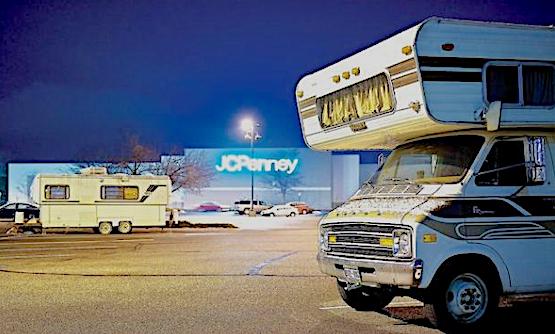
Sharing is caring!
Thanks for your support! If you make a purchase using our links in this article, we may make a commission. And, as an Amazon Associate, I earn from qualifying purchases. See the full disclosure here .
Updated May 6, 2024
Free overnight RV parking locations can be very beneficial for RVers traveling longer distances from one campground to another. Many of America’s parking lots are empty at night.
Often, RVers going from one park to another do not need the hookups and amenities or expense of a regular RV campground. All they want is a place to park for a couple of hours of sleep before hitting the road again. So here is our list of 25 Free Overnight RV Parking Locations:
Is Overnight RV Parking Legal?
Done correctly, overnight RV parking can be a win-win situation where everyone benefits. Truck stops regularly provide space, showers, meals, and other amenities for truckers and will often extend the service to RVers. They know that, just like truckers, RVers use and pay for the facilities inside.
Your state and the location where you intend to park overnight will determine if it’s allowed or not. Every state has rest areas for safe travel on highways but other locations will vary.
Retail stores like Walmart, Cabelas, and Bass Pro benefit from the sales to overnighters who come in and browse the store the next day. Restaurants like Cracker Barrel will let RVers stay overnight in the hope that their overnight guests have dinner or breakfast in their restaurants.
Maintaining this relationship means that RVers must also be active and respectful participants and respect their hosts and their property. It is essential that we, as RVers, follow proper overnight parking rules of etiquette. If we do not, we may find that the free overnight parking locations currently available to us quickly disappear.
Who decides where an RVer may or may not park overnight during a journey to a distant adventure? The answer should be clear. It’s the owner or manager of the property where the RVer wants to park.
How To Find Free Overnight RV Parking
What if there was an app or a website where you could easily type in your location and free overnight RV locations that are updated by other RVers popped right up on your phone or computer screen?
And what if it only costs you $2.00 a month to have this awesome program available at the touch of a button when you are tired of driving all day. And how much money could you save on campground fees if you just had a free place to park overnight rather than paying $40 or $50 bucks at a campground just to spend the night and then get up and leave in the morning?
Well, you can read the list of the 25 free overnight RV parking locations below but to find each of the specific locations for these businesses that allow free overnight RV parking you should use our favorite website and that is OvernightRVParking .com. We love this app and highly recommend it to our fellow RVers.
It is a search database with over 14,000 free overnight RV parking locations across the US and Canada and it is updated on a regular basis by RVers like you and me so you get the latest most accurate information about every RV parking location.
Keep in mind, for those traveling outside the US, you will have to find other reliable sources for RV parking. Rules for overnight RV parking in the UK for example could be very different than in the US.
And it’s cheap! It’s only $29.99 a year when you use the discount code RVBLOGGER (all caps). We figure if you stay one night for free somewhere you have more than covered the cost of the app. We love this app and try to share it with everyone we know because you just can’t go wrong with it. So, please feel free to click here and use our link and save$10.00 . I bet you’ll love it too!
RELATED READING: Check out our article Free Overnight RV Parking for a complete review of the Website and App for OvernightRVParking!
Overnight RV Parking Etiquette (RVers’ Good Neighbor Policy)
Following these simple rules can go a long way toward keeping our hosts happy and our free overnight parking spots open.
- Stay one night only!
- Obtain permission from a qualified individual.
- Obey posted regulations.
- No awnings, chairs, or barbecue grills.
- Do not use hydraulic jacks on soft surfaces (including asphalt).
- Always leave the area cleaner than you found it.
- Purchase gas, food, and other supplies as a form of thank you, when feasible.
- Be safe! Always be aware of your surroundings and leave if you feel unsafe.
The following is a list of 25 Free Overnight RV Parking Locations offering Free overnight parking to RVers
One thing to always consider is that towns or cities can have local ordinances that can override a business’s policy. That is one reason why it is still essential to ask first. Of there is a local ordinance forbidding overnight parking, there should be signs posted to inform the public.
1. Walmart
Over 80% of Walmart’s across the U.S. allow free overnight parking on their premises. Best of all, there is a Walmart in almost every city or town in America, they are often also easily accessible right off the interstates. Check out our YouTube Video Below about staying overnight at Walmart for free.
2. Bass Pro Shops
Most camping stores like Bass Pro Shops are delighted to allow free overnight RV parking, especially if you are stocking up on supplies or equipment. Just check with the management if you are unsure.
Like Bass Pro Shops, Cabelas will often welcome free overnight parking. Return the favor by stocking up on a few needed supplies before leaving. And again, check with the store manager if you have any questions.
4. Camping World
In the past, Camping World was always a reliable spot for a free, one-night overnight stay. However, as Camping World has changed its focus from accessories, parts, and service to RV sales, this has changed. An increasing number of Camping World stores now have fenced and gated parking lots which are locked at night, and they no longer welcome overnight RV stays.
It does seem, however, that a new twist is developing. Camping World in Wood Village, Oregon now allows overnight RV parking if the RV was purchased at a Camping World dealership.
That is, of course, if you jump through all of the hoops like arriving before closing time, asking permission, verifying that your RV was purchased from a Camping World dealership, and obtaining an overnight RV parking pass which must be displayed on your rig. No parking pass means no overnight stays and the excellent possibility that your RV will be towed off in the middle of the night.
You might think overnight parking at a Casino would be a bit of a gamble, but most Casinos allow free overnight parking. Just check with the casino security to get your overnight parking pass.
6. Churches
As long as it’s not a Saturday or maybe a Wednesday night, it’s not usually an issue to park overnight at a church. For the sake of common courtesy, please ask permission before you spend the night.
7. City Sponsored Parks
City park campgrounds are usually located in smaller towns and run by the municipal government.
There are usually community activities going on, such as sports fields, pools, playgrounds, picnic areas, and even access to lakes and rivers. Therefore, these parks could become more crowded with both locals and visitors on the weekends, so you might Want to plan or call ahead. Often overnight parking spots in these city parks are free or offered for a nominal fee.
Costco locations are often very convenient, and their parking lots are usually well-lit, providing a pleasant environment for overnight parking. As an added benefit, you can purchase gas, camping gear, RV supplies, groceries, and even tires at significantly discounted prices. Just join Costco!
RELATED READING: Check out our article called Is Overnight RV Parking at Costco Allowed? where you can learn all about overnight RV parking at Costco.
9. Cracker Barrel
You’ve been driving all day. You’re tired, hungry, and need a few hours of rest. All you need is a spot to park your RV for a meal and a few hours of sleep. Another overnight RV parking option is Cracker Barrel. Just remember that every location has different rules, so it’s proper etiquette to obtain permission from the manager. You can even call ahead to do this. Now, you can enjoy a good meal and rest.
RELATED READING: Another one of our favorite places to park our RV overnight for free is Cracker Barrel. We wrote an article called Can RVs Park Overnight at Cracker Barrel? where you can learn all about it! We love to stay overnight there because we can get a great dinner at night as well as breakfast before hitting the road in the morning!
10. Elks Lodges
As many RVers know, one of the many benefits of joining your local Elks Lodge is the availability of RV accommodations at Elks Lodges. There are more than 2,000 Elks Lodges in the USA, and about half of them have RV facilities of some sort. Here is a handy link to every Elks Lodge in the US for overnight RV parking.
The facilities range from full-fledged RV parks with 30/50A electric and water hookups, sewer connections, and even Cable TV, to a spot to dry camp in one corner of the Lodge parking lot, and everything in between.
In nearly every case, these RV facilities are for the use of Elk Members in good standing only. Some lodges do allow the RV of a non-elk who is traveling with an Elk RV to stay as well as the guest of the visiting Elk.
11. Boondockers Welcome
Boondockers Welcome isn’t quite free but it’s pretty close! Once you’ve purchased a guest subscription, which is very reasonable by the way, you’ll be able to request stays with thousands of hosts. And Boondockers Welcome adds more and more hosts every day. I get emails from them every few weeks with a list of new hosts they have added.
The Hosts are typically RVers like you and me who are willing to let you stay overnight for free on their property. And you’re sure to make some great friends while saving a few dollars on your adventure. Please go to Boondockers Welcome here and check them out . For a small fee, you can have thousands of free places a year to park your RV overnight!
12. Home Depot
Many big stores such as Home Depot will allow you to park overnight on their lot. Often, the manager of the store has the final say, so it is always best to talk to the manager and get permission. Follow the rules and thank the store by stocking up with some supplies or gear before you leave.
Like Home Depot, some Kmart stores will allow you to park your RV overnight on their lot. The manager of the store does have the final say, so like with Home Depot, it is always best to talk to the store manager and get permission. Follow the manager’s rules and thank the store by getting a few supplies before you leave.
Lowes falls into the same category as Home Depot and Kmart. Many stores will allow RVs to park for free overnight on their lot. The best thing to do is to check with the manager of the store and get permission. Again, follow the rules and thank the store by spending a little money before you leave.
Some malls permit overnight RV parking as well. However, you will want to check with the proper Mall office or authority to get permission to park overnight. You will not want to be woken up at 2:00 am to find out that the Mall parking lot where you are parked does not allow overnight parking, and has called a tow truck.
16. Menards
Unless local ordinances forbid it, Menards is another regional retailer that typically allows RVers to park overnight for free on their lots. Follow the rules of etiquette and ask for permission. Spend a little money to say thank you and be gone by mid-morning.
17. Movie Theaters
You watched a late movie, and you’re too tired to drive on? It’s usually not an issue. Just ask permission if you’re unsure.
18. Moose Lodges
Moose Lodges have the same availability of RV accommodations for its members as Elks Lodges. You must be a Moose member to stay overnight in your RV but there are Moose Lodges all over the US.
19. Rest Areas
Some rest areas (in some States) allow you to stay overnight. You can check with the State Police as well as the Highway Department. Even those rest areas where you can’t stay overnight, you can often pull in for a few hours and take a nap if needed.
20. Sam’s Club
Sam’s Clubs are another very convenient place to stay overnight for free in your RV. Their parking lots are also usually well-lit, which provides a pleasant and safe environment for free overnight RV parking. As an added benefit, you can purchase gas, camping gear, RV supplies, groceries, and even tires at significantly discounted prices. Make sure you have your Sam’s Club card!
21. Super Markets
Supermarkets can provide a well-lit parking spot for RVers. Some RVers view the well-lit parking lots as a safer place to park overnight. Again, always check with the store manager to get permission to park overnight in your RV. And you can stock up on groceries while you are there too!
Target is like the other big stores. Policies may vary depending on the store’s manager. Talk to the manager and get permission before staying overnight. If the store is gracious enough to allow you to use their parking lot overnight, follow the rules and spend some cash before taking off in the morning.
23. Truck Stops
Truck Stops such as Travel Centers of America or Flying J aren’t just for trucks, 18-wheelers, or oversized rigs anymore. RVers are taking advantage of overnight parking at truck stops across the country every day. As long as you follow the rules of truckers, you’ll be fine. Be courteous, park straight, and be gone by mid-morning. Many now have separate parking areas for RVs.
It is important to remember that Truck stops do attract all sorts of people. Make sure you lock your doors, and windows, and keep valuables out of sight for safety whether you’re in the RV or out exploring.
24. Planet Fitness
Some Planet Fitness locations allow RVers to park overnight if they have a membership to the gym. It’s a great place to park for the night as well as get a workout in the morning!
25. Harvest Hosts
Harvest Hosts is by far our favorite free (or almost free) overnight RV parking location. It’s not exactly free because you have to pay a very reasonable membership fee but then you have access to almost 1000 free overnight RV parking locations. And these are gorgeous locations at wineries, breweries, and farms across the US. And you can add on Golf Plan to add another 400+ free overnight RV parking locations.
PRO TIP: In our opinion, this is the very best option for free overnight RV parking. It’s way better than any parking lot you can find! I wrote an article called Harvest Hosts – A Great Way to Camp for Free! or you can use our link and go straight to the Harvest Hosts website to learn all about it. If you use our link you will get a 15% discount on the membership fee so please feel free to take advantage of this offer from us to you!
How Long Can You Stay At Walmart In An RV?
Having a free convenient spot to park your RV overnight along your way is a great option. However, when it comes to Walmart or any of the places on this list don’t overstay your welcome.
In most cases, overnight parking means overnight and heading out in the morning. These aren’t campgrounds these businesses are doing RVers a favor. If there is a reason you will be staying more than one night, this must be communicated to property owners or managers.
Check out our YouTube video review of 4 different Harvest Hosts locations in 3 different states!
Final Words About Overnight RV Parking
If you ever wondered what stores or businesses allow overnight RV parking you now have a list of 25 Free Overnight RV Parking Locations. These are many of the most popular businesses that provide free overnight parking spots to RVers.
There may also be many more out there just waiting to be discovered. Free overnight parking spots offer RVers a fantastic and cost-effective way to travel America’s highways and byways.
By practicing proper overnight RV parking etiquette as well as working hard to be good RV neighbors, we can help ensure these fantastic overnight parking locations remain open to us in the future.
The overriding principle, when parking overnight on someone else’s property, is that we need their invitation and their permission to do so. Some RVers prefer to telephone ahead for approval so that they can make other arrangements on those occasions when the store says no
As you set out on the open road in your RV, you will undoubtedly discover your own favorite free RV overnight parking spots. Feel free to share them with others.
For more info to find free overnight RV parking locations check out our other related articles below:
Related Reading:
– Free Overnight RV Parking – Overnight RV Parking At Walmart – Know Before You Go – Overnight RV Parking At Walmart – Know Before You Go – Harvest Hosts – A Great Way to Camp for Free!
What are your tips for free, safe, or exciting overnight RV parking locations? Please share them in the comments below! You never know but your comment may help a fellow RVer!
Mike Scarpignato – Bio
Mike Scarpignato created RVBlogger.com over five years ago in 2018 to share all we have learned about RV camping.
Mike is an avid outdoorsman with decades of experience tent camping and traveling in his 2008 Gulf Stream Conquest Class C RV and 2021 Thor Challenger Class A motorhome.
We attend RV Shows and visit RV dealerships all across the country to tour and review drivable motorhomes and towable trailers to provide the best evaluations of these RVs in our blog articles and YouTube videos.
We are 3/4-time RVers who created RVBlogger.com to provide helpful information about all kinds of RVs and related products, gear, camping memberships, tips, hacks and advice.
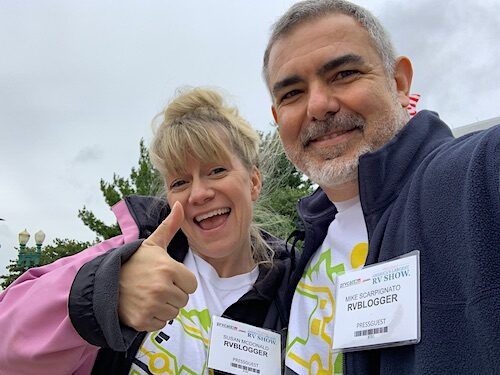
2 thoughts on “25 Free Overnight RV Parking Locations”
Pay attention to City Ordinances that prohibit Camping in the City. For example: Sedona AZ- a lot of these apps and websites suggest parking in private property business lots which is illegal. https://sedona.municipal.codes/SCC/9.10.010
We’re relatively new to RVing, but we’ve had our best rest at Cracker Barrels and casinos. We’ve found WalMart lots to be sketchy sometimes, and near cities they are more likely to have homeless long-term parkers. We’ve encountered some hostility in truck stops; one night we were neatly parked in the RV section of a Flying J when a truck went through in the wee hours and blew his nifty train horn for several seconds. We haven’t tried Cabela’s yet, but our local store has a nice parking area and a dump station, so we’re open to the idea.
Leave a Comment Cancel reply
Save my name, email, and website in this browser for the next time I comment.
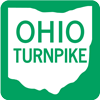
- Fuel Prices
Overnight Parking For RVs/Travel Trailers
- Tour Bus Pre-Notification
- Electrify America Charging
- Tesla Supercharger

Customers traveling on the Ohio Turnpike with Recreational Vehicles (RVs) and Travel Trailers can enjoy the convenience of overnight parking with hook-ups at eight (8) service plazas on the Ohio Turnpike.
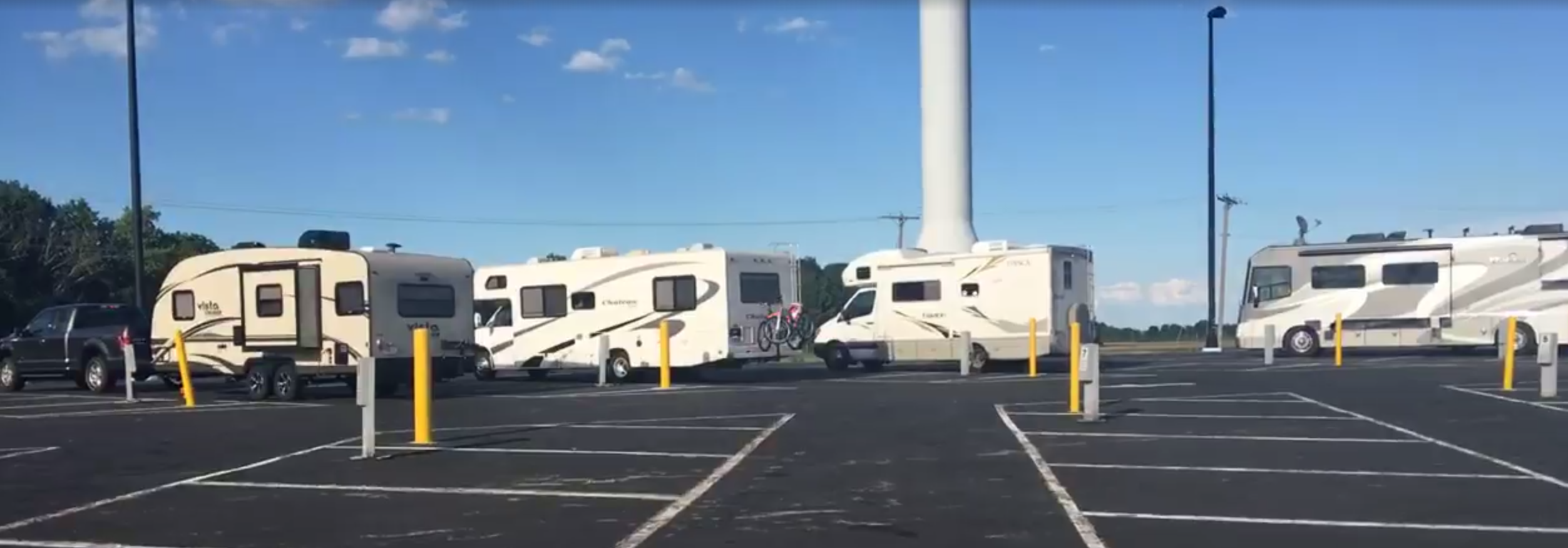
- Ohio Turnpike Plazas offer up to 11 RV parking spaces per plaza.
- Customers use the self-pay ticket machine located at the entrance to the RV lot, then display that receipt in window or on the dashboard of their vehicle.
- The Ohio Turnpike RV lots can accommodate vehicles up to 40 feet in length.
- All vehicles must be parked head-in or head-out, parking in any other direction is prohibited.
- The designated parking areas are open for occupancy for a one-night stay and are available on a first-come, first-served basis.
RV parking areas offer electrical outlets (20 and 30-120V; 50 AMP-240V), a wastewater dump station for black/grey water tanks and potable water filling station, all for a $20.00 fee.
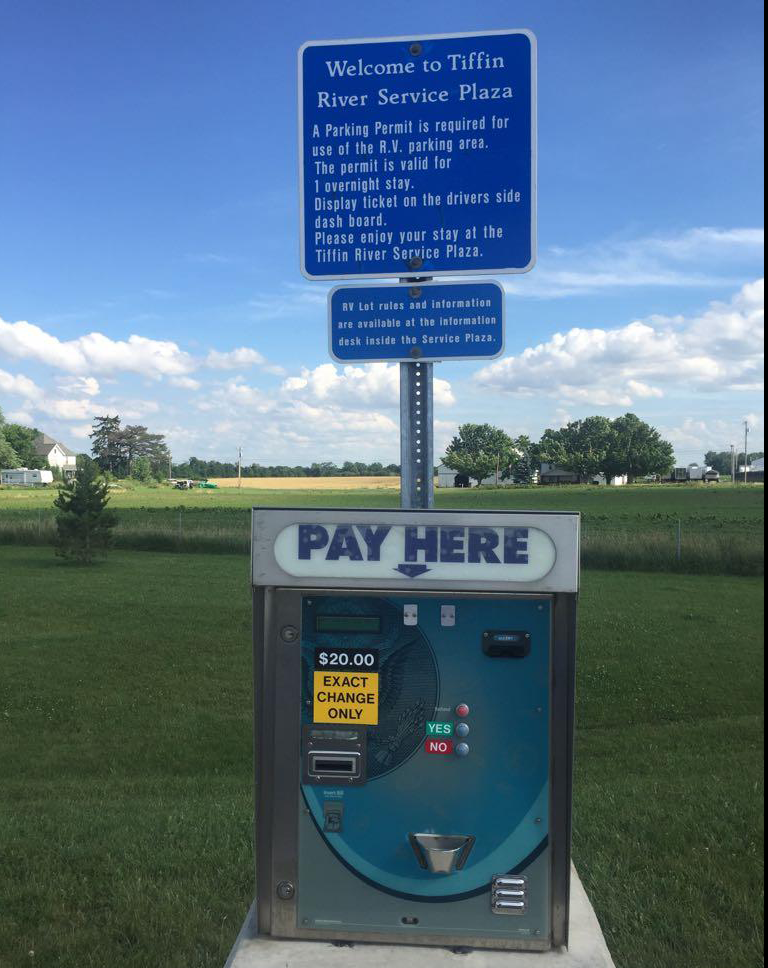
Additional RV Lot Rules
- RV Lot includes the paved areas only. The adjacent lawns, mounds, and/ or wooded areas are not for camping. Do not trespass beyond fenced areas, which is private property.
- One RV unit and one vehicle are permitted per RV space.
- A distance of 15 feet should be maintained between units.
- Customers must keep their site neat and orderly.
- Black and gray water tanks must be discharged at dump stations only.
- Pets are permitted on a leash, but are not permitted inside the service plazas. Guests are responsible for their pets and cleaning up after them.
- No temporary animal pens are permitted.
- All visitors are required to comply with any applicable federal, state or local laws.
- Anyone under 18 years of age must be accompanied by a parent or guardian.
Can You Park Overnight At Rest Areas?
By Lynne Fedorick
Web Story by Levi Henley
Driving an RV or hauling a trailer when you are tired is dangerous.
Some states don't allow sleeping overnight at rest stops., however, all rest areas are meant for short rest stops, many rest areas do allow you to sleep in your vehicle., tips for staying, overnight at rest stops.
Find rest stops along your route
Use an excellent routing and trip planning app like RV LIFE Trip Wizard and the RV LIFE App. to find rest areas and other points of interest on your route.
Trust Your Gut
It's always best to trust those funny feelings you get about places. If a rest area looks sketchy, don't stay there. The next one won't be too far away.
Carefully check rest areas for "No Overnight Parking" signs.
These signs are often put there because there have been problems with campers there in the past.
If there is such a sign, have a quick rest and move on to the next area.
Be Mindful Of Truckers
If possible don't take up parking spots obviously meant for tired long-haul truckers. They need these spots more than you do.
However, if you are obviously too tired to stay on the road safely, stop and rest for at least a few hours.
Don't camp.
Keep your slides and awning in.
Don't bring your chairs out., have something to eat or drink., sleep, have a light breakfast, and leave., read the extended article.
Get an in-depth look with the extended article version at RV LIFE
See All RV LIFE Stories
More overnight parking alternatives for overnight rv camping.
- AZ Things to Do
- CO Things to Do
- FL Things to Do
- GA Things to Do
- ID Things to Do
- IN Things to Do
- KS Things to Do
- MI Things to Do
- MO Things to Do
- MT Things to Do
- NM Things to Do
- NC Things to Do
- SD Things to Do
- TX Things to Do
- UT Things to Do
- WI Things to Do
- WY Things to Do
- Paddleboarding
- Pets & Farm Animals
- Photography
- Canyons/Gorges
- Praires/Grasslands
- Rivers/Lakes
- Camping Collections
- How to Guides
- RV Purchase
- International
- Assorted Topics
Sleeping at Rest Areas: Is it Legal in an RV? – A State By State List
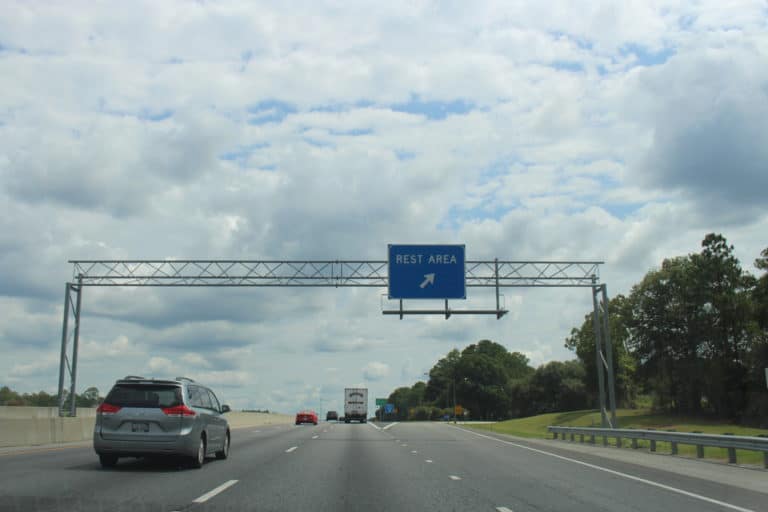
Any RV driver who has traveled long distances across the United States knows that sometimes you just want to stop overnight somewhere convenient to the highway to get some sleep. Sleeping at a rest area seems to make sense. But is it legal?
If you’re stopping at night and plan to get up early to continue your roadtrip, you may not want to spent $30-$40 in an RV park if you may not even connect to its utilities. But what about sleeping at a rest area?
What are Rest Areas?
So what’s the answer, connecticut, massachusetts, mississippi, new hampshire, north carolina, north dakota, pennsylvania, rhode island, south carolina, south dakota , west virginia, rv community experiences with overnight parking at rest areas, advice for staying overnight in a rest area in your rv, summary of state rules, background on rest areas.
You may be eyeing rest areas right now as you drive down the highway. You may be wondering, can we just pull over and stay in the rest area for the night or will we get a ticket?
Having found ourselves in this situation recently as we drove across the country, I decided to find the official answer.
(Despite not knowing at the time whether it was legal or not, we stayed in a stunningly beautiful rest area in Idaho on the Snake River . We also stayed at an area near a river in South Dakota, but later learned from the SD government that it was not allowed to stay at the Dude Ranch Lakeside Use Area .)
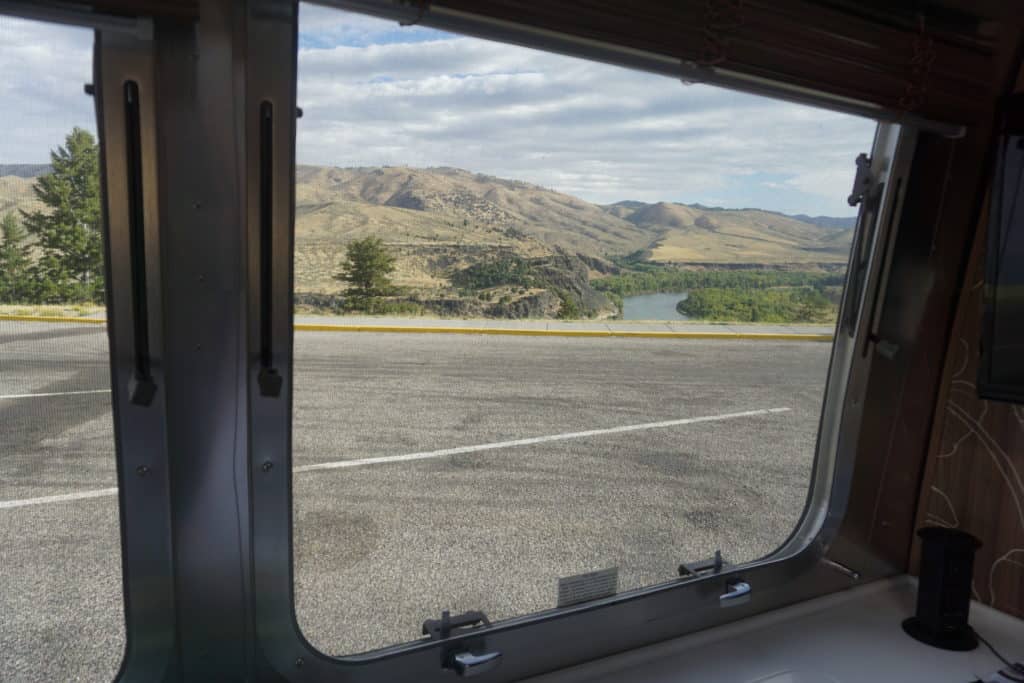
If you’ve looked for the answer as to whether RVs can stay overnight in a rest area, you are likely finding conflicting information, as I did when I started this search.
Some websites have outdated or inaccurate information, unfortunately.
Hence, I did some research on the topic by reviewing current state statutes, regulations, rules, and any other policy information I could find online about whether it is legal for vehicles to park overnight in highway rest areas and any parking hour limits.
If I couldn’t find a clear answer about sleeping at rest areas, I contacted the state department of transportation for more information to see if they have any official or unofficial policies on the matter.
The state-by-state list of results is below.
Rest areas, sometimes referred to as rest stops, are typically located every hour or so along highways in the United States.
Congress passed the Federal-Aid Highway Act of 1956 which created the National System of Interstate and Defense Highways and included a provision for the construction of safety rest areas along the highways.
Given that the areas in which highways were constructed tended to be in remote and previously lightly traveled areas, facilities for motorists were frequently sparsely located so drivers needed safe places to take a break along the newly constructed highways.
Two years later, in 1958, the American Association of State Highway Officials released a policy document that outlined site guidelines and national standardization requirements for rest areas.
AASHO’s rest area document stated that:
“Rest areas are to be provided on Interstate highways as a safety measure. Safety rest areas are off-road spaces with provisions for emergency stopping and resting by motorists for short periods. They have freeway type entrances and exit connections, parking areas, benches and tables and may have toilets and water supply where proper maintenance and supervision are assured. They may be designed for short-time picnic use in addition to parking of vehicles for short periods.” (American Association of State Highway Officials) American Association of State Highway Officials
Since then, many states have added state welcome centers with promotional materials about each state.
Some states have also been expanding their rest areas to meet the needs for safe parking places for long-haul truckers (e.g., see North Carolina’s response below) and for RVers.
For example, Ohio has developed overnight parking for RVs on the Ohio Turnpike, complete with electrical hookups, potable water available, and an RV dump station. These are available on a first-come, first-served basis. These make it very clear that it is legal to be sleeping at these rest areas.
Rest areas have also faced budget cuts from states, with some rest areas being closed, much to the chagrin of travelers.
The answer as to whether you can sleep overnight at rest areas in your car or RV depends on several factors:
- What state you’re in
- What rest area you’re at within that state
- How comfortable you are ignoring signs saying that you can’t camp or park overnight.
Here’s the basic gist:
- Official state policy response : Only some states have official policies on the books about how long you can “rest” at a rest area. Most states prohibit “camping” at rest areas, but camping is not the same as “resting” in your RV. If you’re not convinced that “resting” and “camping” are different, see the emailed response to my question about whether it is legal to park overnight at a rest area from the Louisiana Department of Transportation below, which states “You can stop and sleep overnight. You just can’t open a pull out i.e. no “camping.”” So sleeping at a rest area is considered to be different from camping at a rest area.
- Unofficial state policy response : The unofficial overwhelming response I received from states to my question about whether it is legal to park overnight in an RV at a rest area is that rest areas are there to keep drivers safe and that a tired driver is not a safe driver. Hence they are not going to ask tired RV drivers to move on unless the area is unsafe for some reason. For example, North Carolina’s Department of Transportation representative emailed me to say, “Rest areas are about safety and we do not want sleepy drivers on the road causing accidents.” Again, this makes it clear that it is ok to sleep at a rest area.
- Unofficial RV community response: The unofficial answer from the RV’ing community is that many people “rest” overnight in their RV at rest areas along highways all the time, and only a tiny percentage have ever been asked to move on, despite there being “no overnight parking” signs posted. This seems to confirm the unofficial state policy responses above.
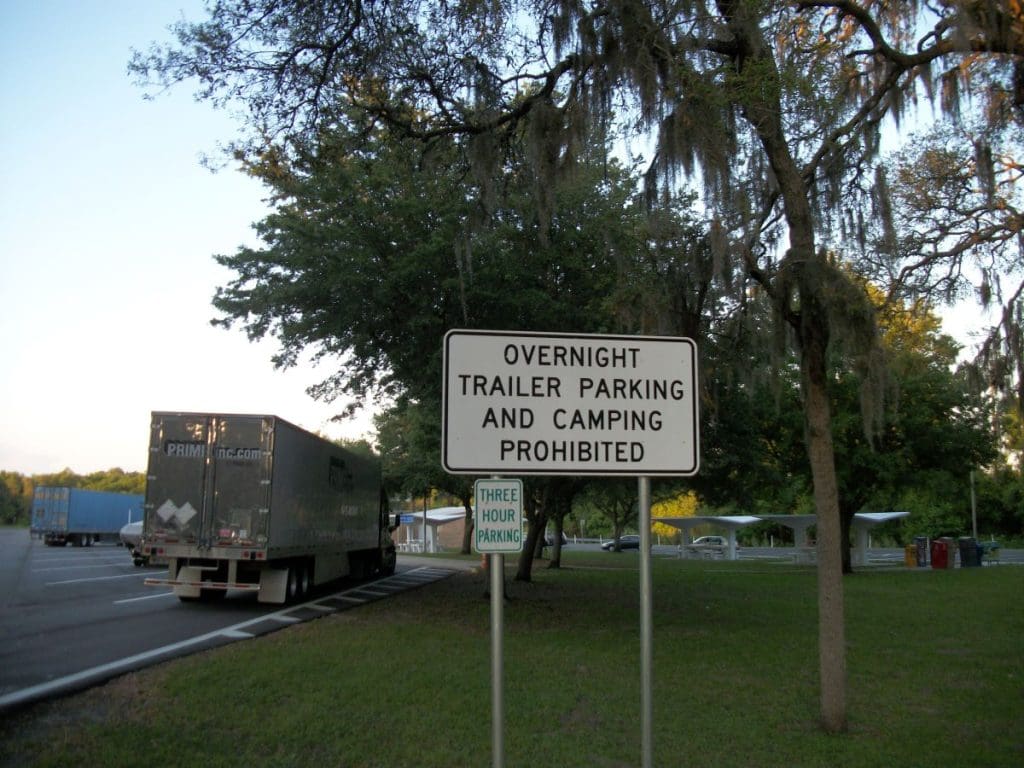
State List of Rest Area Official Overnight Policies
Each state has its own laws, rules, regulations, and other policies regarding rest areas. In most states, the official rules lie with the state department of transportation, given that highways fall under the purview of the Federal Highway Administration.
In my quest to find the official state policies on RVs staying overnight at rest areas, I reached out to the state’s department of transportation (DOT) if I couldn’t find an official policy online.
The following list of states provides a link to the actual policy text concerning sleeping at rest areas, if I was able to located such a policy.
If I received a pertinent response from the state DOT, I included that response too.
Some state DOTs responded that some other state agency was responsible for patrolling the rest areas and were not able to provide a clear answer. I left those blank, until I’m able to find out more information about the state rest area policy or lack of policy.
I will fill in the remaining states about sleeping at rest areas as I obtain more information. If you know of specific information about a particular state, please add a comment below and I’ll update this list.
- “The general rule is that motorists can use rest stops to rest, even at night—but not to camp. If a motorist has set up shop and appears to be camping, they can be asked to leave (and potentially ticketed) by law enforcement. A good rule of thumb for any motorist would be not to park in any rest stop for longer than 24 hours. (Source: Emailed response from Alaska Department of Transportation and Public Facilities, 11/14/2018)
- “The following are prohibited in the rest area: camping/campfires” ( Source : Arizona Department of Transportation, Rest Area Rules)
- “Overnight only. There is not [a] statute, just signage for each rest area at the location.” (Source: Emailed response from the Arkansas Department of Transportation, 11/1/2018)
- “You may: Stay up to 8 hours in any 24 hour period.” ( Source : California Department of Transportation, Rest Area Usage Policy)
- “There is no overnight parking or camping allowed in Colorado’s rest areas.” ( Source : Colorado Department of Transportation, Colorado Rest Areas & Welcome Centers)
- “I’m not sure there is a written policy or statute but for the most part the State Police will not bother RV’s that park at our rest areas overnight as long as you’re discrete.” (Source: Emailed response from the Connecticut Department of Transportation, 11/1/2018)
- “The Smyrna Rest Area has a parking lot for truck drivers to take a rest period located in the back. It is acceptable to use an RV to rest with a time limit of 8 hours in the back lot only, but there is no camping allowed.” (Source: Emailed response from the Delaware Department of Transportation, 11/8/2018)
- “Overnight camping is not permitted, but visitors may stay for up to three hours.” ( Source : Florida Department of Transportation, Rest Area Information)
- “Nothing in this Code section shall prohibit the normal, customary, and temporary use of safety rest areas , welcome centers, tourist centers, and other property of the department or state highway system specifically designated for purposes of resting , sleeping, eating, or other similar activities by persons traveling by vehicle.” ( Source : Office Code of Georgia, 32-6-6. Camping on Roadways; penalty)
- “Certain uses of parked vehicles prohibited between 6:00 p.m. and 6:00 a.m.; definition; exceptions. (a) No person shall use any vehicle for purposes of human habitation, whether or not the vehicle is designed or equipped for that purpose, while the vehicle is parked on any roadway, street, or highway or other public property between the hours of 6:00 p.m. and 6:00 a.m. or while the vehicle is parked on private property without authorization of the owner or occupant authorizing both the parking of the vehicle there and its use for purposes of human habitation. (b) As used in this section “purposes of human habitation” includes use as a dwelling place, living abode, or sleeping place. (c) This section does not apply to the parking of vehicles and their use for purposes of human habitation in parks, camps, and other recreational areas in compliance with law and applicable rules and regulations, or under emergency conditions in the interest of vehicular safety.” (Source: Hawaii Statewide Traffic Code, Chapter 291C, §291C-112 )
- “Time Limits. Occupancy of the rest areas on interstate highways is limited to ten (10) consecutive hours. Occupancy of rest areas on other routes of the State Highway System is limited to sixteen (16) consecutive hours.” ( Source : Idaho Transportation Department, Rules Governing Safety Rest Areas, IDAPA 39.03.50)
- “Our rest areas include parking spaces to use the facility. If there is parking space available, you may park there. You may sleep in your car, RV or truck, but please note that you are assuming a safety risk by taking that action. INDOT is not liable for any activity that may occur while you are parked there, regardless of the time of day.” (Source: Emailed response from the Indiana Department of Transportation, 11/1/2018)
- “The posted rules and regulations at Iowa’s rest areas prohibit camping or staying at a rest area for more than 24 hours without extenuating circumstances. As long as you’re legally parked, staying overnight will not be a problem.” (Source: Emailed response from the Iowa Department of Transportation, 11/1/2018)
- “The following restrictions shall apply to the use of any roadside facility maintained by the department: (1) Overnight camping shall be permitted for one night only. (2) Vehicles shall not be parked in a manner which obstructs the roadside facility. (3) Parking for more than 24 hours shall be prohibited.” ( Source : Kansas Department of Transportation regulations, 36-32-2)
- “Time Limit; Restricted Uses. (1) Except as provided in Section 3 of this administrative regulation, the use of a safety rest area located within the right-of-way of limited access facilities, as defined in KRS 177.220, shall be limited to a maximum of four (4) hours during any twenty-four (24) hour period for the same person or group of persons.” (Source: Kentucky Administrative Regulations, 603 KAR 5:040. Use of rest areas)
- “You can stop and sleep overnight. You just can’t open a pull out i.e. no “camping.” If you are staying for more than 4 hours, find the security guard and inform them that you will be staying for a nap so he won’t bang on your door for a “wellness check.”” (Source: Emailed response from the Louisiana Department of Transportation & Development, 11/1/2018)
- “MaineDOT rest areas are specifically signed for ‘No Camping’ and ‘No Overnight Parking.’ These facilities are intended for things like: stretching your legs, getting travel information, using the restroom, getting a snack from the vending machine, walking the dog, or using the cell phone. If a person is over-tired, they can certainly take a brief ‘power nap’ to enable them to continue on their journey in a safe manner, but under no circumstances are these facilities intended to be used for an overnight stay. Hotels and campgrounds exist for that purpose.” (Source: Emailed response from the Maine Department of Transportation, 11/5/2018)
- “Length of Time for Use: Visitors may not use an area for more than 3 hours without a permit from the caretaker or the Maryland State Police.” (Source: Code of Maryland Regulations, Control and Use of Rest Areas, 11.04.07.07)
- “Camping and Overnight Parking: Camping and overnight parking are prohibited.” (Source: Code of Maryland Regulations, Control and Use of Rest Areas, 11.04.07.11)
- “From what I can tell, there are no cut and dry rules about this in Michigan. I don’t believe there is any specific mandate from MDOT that prohibits overnight parking…” (Source: Emailed response from the Michigan Department of Transportation, 11/2/2018)
- “Visitor length of stay limits: All other motorists are permitted to stop at rest areas for up to four hours, where posted. See MN Statutes § 168B.04.” ( Source : Minnesota Department of Transportation, Safety Rest Areas & Waysides)
- “As driver safety is paramount to our agency, we provide an maintain rest areas for both commercial and non-commercial motorist to rest should they feel it is needed. It is allowed to park overnight in a recreational vehicle. The limit on parking is 24 hours. I should note that within the truck parking area, lateral space is limited so we ask folks no to pull out any extensions that would go into the adjacent parking space or cause a safety issue.” (Source: Emailed response from Mississippi Department of Transportation, 11/24/2018)
- “Overnight camping or parking is prohibited. Maximum length of stay permitted is ten (10) hours. If vehicles remain longer than the permitted time, contact the NDOR Area Supervisor.” (Source: Rest Area Rules and Regulations, Guidance Document)
- “I’m not aware of any policies regarding how long an RV or truck driver may stay in NJDOT-maintained rest stops, however I know drivers do sleep overnight.” (Source: Emailed response from New Jersey Department of Transportation, 11/9/2018)
- “New Jersey Turnpike Authority regulations limit truck drivers to 10 hours in the service area parking lots.” (Source: Emailed response from the New Jersey Turnpike Authority, 11/9/2018)
- “Legally parked vehicles, such as vehicles parked in a designated rest area for not more than 12 hours, or vehicles used or to be used in the construction, operation or maintenance of public utility facilities and which are left in a manner which does not interfere with the normal movement of traffic shall not be considered abandoned vehicles for the purposes of this section.” (Source: New Jersey General and Permanent Statutes, 39:4-56.5. Abandonment of motor vehicle)
- “Remaining in rest areas and similar facilities; penalty: No person shall remain, or willfully allow any property under his control to remain, in any publicly owned and controlled rest and recreation area or sanitary or tourist information facility, which area or facility is located immediately adjacent to a public highway and is intended for use by persons travelling the highway, for more than twenty-four hours in any three-day period, unless otherwise provided by law.” (Source: New Mexico Statutes, 67-8-22.)
- “Parking of vehicles for longer than three hours during the hours of darkness is not permitted in any rest or parking area or scenic overlook; provided, however, that a commercial motor vehicle, as defined in section 820.1 of this Title, may, except as provided otherwise by the Department of Transportation by the posting of signs, remain motionless at such an area for up to 10 hours if the commercial vehicle driver is present and is required to use this period as off duty or sleeper berth time to allow rest in accordance with Federal or State motor carrier safety hours of service regulations.” ( Source : Official Compilation of Codes, Rules and Regulations of the State of New York, 17 CRR-NY 156.3)
- New York State Thruway Travel Plazas: “Please be advised that Thruway Authority Service Areas are posted for a maximum stay of 4 hours and are not designed for multiple day stays.” ( Source : New York State Thruway Authority, Service Areas)
- “We do have a standing policy of no stays longer than 4 hours. We do however allow truckers to spend their allotted parking time be it day or night to fulfill the law on driving time. We do have RV owners spend the night/day at rest areas. Rest areas are about safety and we do not want sleepy drivers on the road causing accidents. We do not allow long term camping or spending more than a night/day in North Carolina rest areas.” (Source: Emailed response from the North Carolina Department of Transportation)
- “RV’s are allowed to stop and park overnight at public rest areas in North Dakota. Many truck drivers spend their 10 hours off at these locations. It is illegal to leave a vehicle parked at a location for more than 48 hours.” (Source: Emailed response from the North Dakota Department of Transportation, 11/4/2018)
- “No camping or overnight parking is permitted.” ( Source : Ohio Administrative Code, 5501:2-4-01 Control and use of rest areas and roadside parks)
- An exception is on the Ohio Turnpike: “Overnight Parking for RVs and Travel Trailers: Eight service plazas* listed above offer overnight parking areas for RVs and travel trailers. The parking areas are open for occupancy for one night only and are available on a first-come, first-serve basis. RV parking areas offer electrical outlets (20 and 30-120V; 50 AMP-240V), a wastewater dump station and potable water filling station for a $20.00 fee.” ( Source : Ohio Turnpike Commission, Service Plazas)
- “Prohibited Activities: Setting up a tent or other structure, camping, or remaining in a Rest Area for more than 12 hours within any 24-hour period.” ( Source : Oregon Department of Transportation, Highway Division, 734-030-0010)
- “The following specified activities or actions are prohibited in roadside rest areas: Parking or standing of a vehicle for more than 2 hours in a single 24-hour period or in excess of the posted time limit. Vehicles unattended for more than 24 hours will be considered abandoned and subject to removal and storage at the sole cost and expense of the owner.” ( Source : Pennsylvania State Code: Chapter 443. Roadside Rest Areas)
- “Temporary rest stops permitted–Time limit. No person temporarily resting in any vehicle is in violation of the provisions of § 31-7-15. For purposes of this section, temporarily resting means stopping, parking, or otherwise keeping or occupying any vehicle in a rest area, or any portion thereof not officially designated for camping, for not more than three consecutive hours or, if the driver of a commercial motor vehicle subject to the provisions of 49 C.F.R. Part 395, as of January 1, 2009, for not more than ten consecutive hours.” ( Source : South Dakota State Code, 31-7-17)
- “Camping prohibited at rest areas on interstate system–Petty offense. No person may camp at any rest area established by the department within and adjacent to the national system of interstate highways in South Dakota. A violation of this section is a petty offense.” ( Source : South Dakota State Code, 31-7-15)
- “No overnight parking is allowed. There is a two-hour parking limit.” ( Source : Tennessee Department of Transportation, Welcome Center & Rest Areas)
- “A person commits an offense if the person remains at a rest area for longer than 24 hours or erects a tent, shelter, booth, or structure at the rest area…” ( Source : Texas Transportation Code – TRANSP § 545.411. Use of Rest Area: Offense)
- “All rest areas are posted for no overnight camping. However, extended stays are permitted and are monitored by the on-site staff and the Highway Patrol.” (Source: Utah Department of Transportation, Rest Areas)
- Limited-Access Facilities: State Traffic Committee Regulations, Article 2.11 prohibit overnight camping along limited-access facilities, including rest areas, except at particular rest areas where the Committee approves overnight camping. (However, as far as I know, the Committee has never authorized overnight camping at any of the rest areas along limited-access facilities.) In Vermont, limited-access facilities include the entire Interstate System, as well as certain segments of other highways, such as US 2 between St. Johnsbury and Danville, US 4 between the NY/VT state line and Rutland, US 7 between Bennington and Dorset, the Vergennes Bypass segment of US 7 in Ferrisburgh, and VT 279 (the Bennington Bypass).
- Other Highways: 19 V.S.A. § 1106 generally prohibits overnight camping on any part of a public highway right-of-way. Another statute, 23 V.S.A. § 1106 also prohibits overnight camping at State highway rest areas, picnic grounds, parking areas, or park-and-ride facilities, unless a particular facility has been designated for overnight camping by the State Traffic Committee. (Again, I am not aware of any particular facility designated for overnight camping by the Committee.)
- There is no specific hour limit defining the point at which use of a rest area becomes “overnight camping.”” (Source: Emailed response from the Vermont Agency of Transportation, 11/2/2018)
- “Can I park overnight or use the rest area as a park and ride location? No, overnight parking is not allowed and unattended vehicles will be towed at the owner’s expense.” (Source: Virginia Department of Transportation, Safety Rest Area – Most Frequently Asked Questions)
- A. Waysides identified by name and without lights shall be open from 8 a.m. to one hour after sunset. Areas having security lighting will be open at all times.
- B. When an area is posted for limited parking, the operator of each vehicle may be required to sign a register setting forth the time of arrival.
- C. When posted, parking shall be limited to the period specified.
- D. No overnight parking will be permitted.
- E. Camping is not permitted at any time.” ( Source: Virginia State Code, 24VAC30-50-10)
- “You may: Park only in designated parking areas for a maximum of 8 hours, unless otherwise posted.” (Source: Washington State Department of Transportation, Safety Rest Area Rules and FAQ’s)
- “Overnight parking for tractor trailers (with the exception of oversized vehicles) and campers is allowed at the travel plazas and the rest areas in the areas designated for large vehicles.” ( Source : West Virginia Parkways Authority)
- “Camping Policy: Wisconsin Statute 86.025 prohibits camping by any person on public highways or adjacent lands.” ( Source : Wisconsin Department of Transportation, Rest Area Guidelines)
- “Long-term Parking: Long term parking at highway rest areas is not allowed, as it is not consistent with the purpose and design of the facilities and can cause problems relative to the use and maintenance of the site. Long term would be considered as vehicles parked at a roadside site for more than a 24-hour continuous period, occupied or not. If a vehicle is parked at a roadside facility for more than this time period, it may be reported to the State Patrol and the procedure for removal will begin.” ( Source : Wisconsin Department of Transportation, Rest Area Guidelines)
- “Camping is prohibited at rest areas, but drivers who need rest to safely continue their travels can sleep in their vehicles in the parking lots. The National Sleep Foundation recommends a nap of 15-20 minutes to improve alertness and driving skills. If you need more than a nap, you can sleep in your vehicle for a longer period, but don’t pitch a tent, extend your RV’s slideouts or otherwise set up for an extended stay.” ( Source : Wyoming Department of Transportation, Wyoming Rest Areas brochure)
A review of the comments posted online by RV’ers about overnight parking in rest areas seems to indicated that most people who have stayed overnight in a motorhome, fifth wheel, travel trailer, etc at a highway rest area have never been ticketed or even requested to move from their parking spot.
For example, see the sample statements posted online below:
- “We travel lot and use rest areas all the time. Even the 3 hour posted ones. Haven’t been bothered once in 25 years. You pull into a space and shut it off. That’s it. No slides out, no lawn chairs, no levelers, etc. If you can’t just get behind the wheel and drive off you’re asking for a knock on your door. The signs are mostly there to keep people from using it as a campground or stealth camping for over a day (I’ve seen it tried). Gives security a way to move someone along if they overstay their welcome. The rest area is designed for people to sleep if they are too tired to drive. I doubt in the remote chance security or the police knocked on your door they would make you move along if you told them you were afraid of falling asleep at the wheel.” (Camping locations, plans, & trip reports board, IRV2 web forum, 12/30/2016)
- “Any of the rest areas we’ve used, I haven’t seen any such caveats. We’ve stopped as early as 5PM & as late as 2AM, rarely leaving before 9AM, & have never been approached by any authority saying we’ve overstayed an 8 hour time limit.” (Navigation, routes & roads board, IRV2 web forum, 9/13/2015)
- “I’m sure the intent of the 8 hour limit is to prevent multiple day camping. The intent of a rest stop is to give motorists (including RV’ers) a place to stop, rest, sleep, walk, eat, etc. I’ve never been questioned but I used to worry about it until I decided that most cops would rather see you sleeping comfortably in your RV than barreling towards them (or their loved ones) at 70 mph in a 30,000 lb bullet. I wouldn’t think twice about sleeping in my car as long as I needed to at at rest stop, why should I be concerned just because I’m way more comfortable sleeping in an RV? If I do end up getting a ticket someday, so be it, but I’d rather be safe in the meantime.” (Navigation, routes & roads board, IRV2 web forum, 9/13/2015)
- “In 14 years, (115k miles), traveling in my coach I’ve overnighed in dozens of rest areas, in numerous states with similar signs posted, often for longer than 8 hours. I have never been hassled.” (Navigation, routes & roads board, IRV2 web forum, 9/13/2015)
If you decide that staying in a rest area works for you, here are some general tips:
- Do not put out anything to make it look like you’re “camping.” Do not put out your chairs, bbq grill, awning, etc. The goal is to look like you’ve simply parked your vehicle.
- Do not extend your slides.
- Do not put down your leveling jacks.
- Do not disconnect your trailer or fifth wheel from your tow vehicle.
- Keep your pet(s) inside with you, unless you’re walking them on a leash.
Sleeping at rest areas works well for many RVers who simply want to rest for the night before continuing on their travels.
The general consensus among the RV community is that you are not going to get a ticket for staying at a rest area, despite signs limiting the number of hours you can park there.
If you have any updates to the state-by-state rest area policies, please post a comment so that we can update this list.
- Privacy Policy

- You are here:
- Home »
- Blog »
- » Sleeping at Rest Areas: Can RVs Park Overnight at Rest Stops?
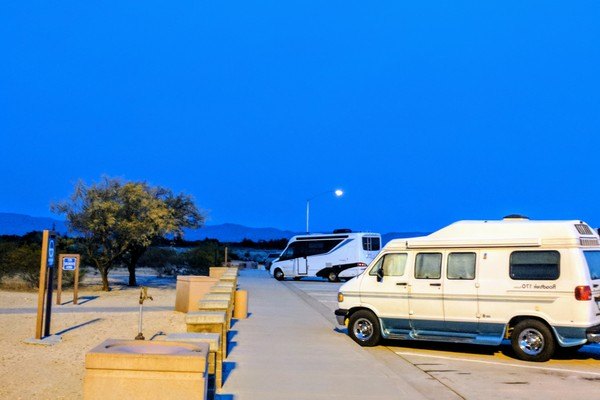
Sleeping at Rest Areas: Can RVs Park Overnight at Rest Stops?
- June 8, 2021 /
- RV Parking /
- By James V.
It was 1956 w hen the first rest safety areas were opened in America. They were not elaborate, well lit, and were often the focal point of many horror movies that produced a lot of nightmares. The good news is that since that beginning, states have taken the pains to upgrade their rest stops so they are safer and cleaner.
Can RVs park overnight at rest stops? This will depend on the state that you are traveling through. Even though the rest stops are mainly on federal interstates, the individual state is responsible for their upkeep, rules, and enforcement of those rules.
Doing good research will help you avoid embarrassing situations.
To learn more about whether RVs can park overnight at rest stops throughout the country, just continue to read our article. It has the information you want to know about as well as links to the different states’ rules.
Can You Sleep at Rest Stops?
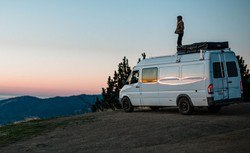
The answer to this question will also apply to many of the other sections in this article. We will provide a comprehensive table in a few sections from now so you can do a quick check on which states allow sleeping and so on.
Every state has the freedom to make its own rules so the answer will be yes and no. You will have to do some research on the issue as there is a gray area that influences the authorities on whether to ask you to move on or let you remain for the night.
The gray area is the boundary between the safety issue of sleeping all night in a rest area and keep tired drivers off the road. The rest areas were designed for the latter but many people found these spots convenient and a way to save on hotel or campground costs.
So you will see people in RVs, and big trucks, stopping at rest areas and spending the night. The semi-truck drivers have to comply with federal driving laws so they opt to use the rest area because it is easier to maneuver their rig. Many motel and hotels do not have parking lots that will accommodate those rigs.
These are examples of why there is what may seem a lack of enforcement of the rules.
Is it Illegal to Sleep in Your Car at a Rest Stop?
This is only illegal if the state has created and implemented a law stating that it is illegal to sleep in your car at a rest stop . Many cities have such rules, possibly counties and states as well. They also have rules on where you can and can’t sleep in your car.
One state makes it illegal to sleep in your car even when it is on private property. That means you have to check the laws of those states you hope to visit when driving your car or RV.
When it comes to rest stops, some states have time limits on how long you can spend there and those time limits prohibit sleeping. They have caretakers help you record your arrival time and they may ask you to move on when your time is over.
You may take short naps but those states that say no overnight parking are telling you that you cannot sleep in your car at their rest stops. Just be careful what other internet bloggers say on this issue as they are not the final word on the issue.
What Does no Overnight Parking Mean?
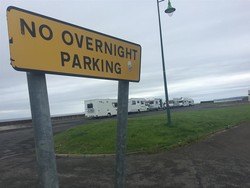
One of the problems that come with this phraseology is that it can be seen as very vague. People interpret the meaning differently and that is the source of many of their problems.
One group of people may think that that wording means that the car cannot stay all night in one spot. It is okay to park for a 5 to 20-minute errand and then they can drive off. However, this group of people has found out the hard way that may not be the case.
Another group takes that wording to mean that you cannot park in those spots at any time during the night. Whether you are there for 5 minutes or an hour doesn’t matter. The sign states that you cannot park there during any overnight hour.
The third group of people who interpret those signs, and whose interpretation really matters, are the authorities. What they have been instructed to do will be the prevailing interpretation. It will be up to the policeman’s good nature if you get to park your car in that spot at all.
What you have to be careful about are towing companies. Some can be quite aggressive and hook up your vehicle and tow it away as soon as they see it. They have a sort of no tolerance attitude towards those people who park in those zones.
Are Rest Stops Safe to Sleep at?
The best thing that can be said is they can be. 99% of the time rest stops are one of the safest places to stop at and get a little sleep. However, there is that 1% chance that you picked the wrong night to sleep there.
Rest stops are often patrolled by state troopers, have other RVs and cars there but state troopers are not usually there 24 7, nor are the other RVs and cars. So you are taking a bit of a risk when you decide to sleep at a rest stop.
If you are a single woman it is best to go find a good hotel in a safe neighborhood and spend the money for a room. Even some of the safest places to be are not always safe for single women or unaccompanied ladies.
Right now only about 14 states allow overnight sleeping so this is not going to be an issue for 36 states. Make sure you understand the difference between sleeping overnight and taking a short nap. As the latter is usually okay.
Overnight RV Parking at Rest Areas
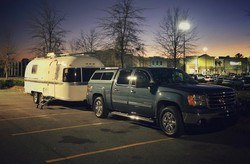
Usually, every rest stop has a sign stating that no overnight parking is allowed. But that restriction often interferes with the stated allowed periods you are allowed to stay in a rest stop. Some states have an extended amount of time which if you arrive at the right moment, can last all night.
This is the gray area raising its head again as those periods state you can stay 6, 8, and even 12 hours in a given 24 hour period. What that translates into is that if you arrive at midnight, you can stay till 6 a.m., 8 a.m., or noon depending on the state you are in.
The other aspect about overnight RV parking is that all state officials would rather see you violate their rest stop rules than have you driving on the roads when you are tired and can’t keep your eyes open.
This is the main factor why you see so many RVers parking for the night at rest stops that do not allow it. They are simply too tired to continue. If they do and they cause an accident, well you know the rest.
What States Allow Sleeping in Rest Areas?
This is the section where you will find the quick comparison chart giving you a brief and fast look at the regulations of different states. A link to those state’s rules is also included so you can read them all BEFORE you travel to the state.
Keep in mind that the rules of one state DO NOT apply in any other state. Many people forget that fact. Also, make sure to park in the right spots for RVs.
** Alaska has rest stops but they have not created any rules about their use. We suggest you contact the DOT of that state to verify and find out if there are any rules or not.
*** Hawaii was left off for obvious reasons. If you find a way to drive there, let us know. The state does have a DOT and if you want to fly there and rent an RV, we suggest you contact them to see what rules apply and if there are rest stops in that state.
Rest Area Rules on Interstates
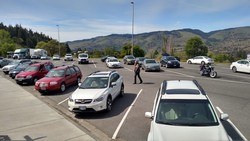
The basic rules are generally the same. Except for overnight camping, every state prohibits camping, sleeping in a tent, or outside of your vehicle. If you do stay the night make sure to leave your awnings retracted, lawn chairs stashed and the bbq grill stored.
You would have to check with each individual state as to the rules of each interstate rest stop under their jurisdiction. It is impossible to place them all here as there will be differences in all the rules. There is no one-size-fits-all here.
Check with the state DOT you are traveling to get all their locations. Most DOTs have a map on the internet for you to look at.
If you lost something, use the links in the chart above to contact the DOT office in the state where your wallet, etc., may have been lost or stolen. This also applies to those RVers who want to send a shout-out to staff or maintenance or caretakers of those rest stops.
While it is nice to hear praise for these hard workers, the people who really need to hear that praise are their bosses at the DOT.
How Long Can You Stay at a Rest Area?

That will depend on the state you are traveling through. Each one has its own time limit and almost all of them ban overnight stays, with some exceptions. If you have an emergency, exceptions will be made but that is up to the governing authorities.
Also, during our research, we came across a mention of overlooks and scenic views. You would have to check with the DOTs of each state you are visiting to see what rules apply to those attractions and picnic spots.
Some will have signs posted but if they are not there, they may have been vandalized so do not think the rules do not apply. It is always best to ask first instead of assuming, that way you will avoid embarrassing moments and maybe a fine.
There will always be exceptions to the rule, just do not abuse them or misapply them as that will ruin it for the next person. The same goes for the kindhearted state trooper who bent the rules for you.
Be respectful of the rules and people in charge as the person you hurt is your fellow traveler or RVer who arrives after you leave. That may be you at one point.
Tips for Camping at Rest Stops
- 1. Do your research - Not only to find a convenient place to stop but for the rules governing rest stops. There are plenty of websites that provide rest stop information so take advantage of that data and make sure you know what is expected of you.
Some of those websites and databases may charge a fee for access. That fee is well worth the money if the information keeps you out of trouble and helps you find some great places to spend the night for free.
- 2. Do not camp - As you see by our chart, no camping is allowed. Camping usually refers to pitching a tent, building a fire, and unrolling your sleeping bags. Some states make a point to clearly state you cannot sleep outside of your vehicle.
However, many rest stops provide picnic areas for lunch and some even have bbq grills. That activity is not camping
- 3. Read all the signs - While some states do have an overnight parking allowance, this is not a uniform policy with all rest stops in the same state. Make sure you can stop for the night before settling in.
The signs at each rest stop will provide the information you need to know for that particular spot.
- 4. Stay safe - This is the most important part of sleeping at a rest stop. If you do not feel safe, then leave; if you see some criminal activity going on, leave; if the rest stop is not well lit, you are by yourself, then you should leave. A good truck stop etc. may be down the road a few miles where you will be safer.
- 5. Don’t camp by yourself - This applies to both men and women as a solo camper, even in an RV is a very vulnerable target. Travel with a companion, spouse or go to hotels instead.
Or travel with a good guard dog or at least one that barks when strangers approach your vehicle.
- 6. If you are not afraid - you may want to consider carrying a gun with you. That option is solely up to you and we won't say much more on this topic. Except to say, make sure you know how to use it correctly.
Advantages of Sleeping at a Rest Stop
Some of these advantages will apply to hotels, motels, and campgrounds as well as staying a night at a rest stop.
- 1. You save money - a free night is always a good advantage. You can use the money you save for other purposes
- 2. You save time - trying to find motels, etc., in the dark and in a strange city can be difficult. Plus, RVs can be hard to maneuver through city streets. rest stops are convenient and they are easy to access, as long as all the RV spots are not taken by the time you get there.
- 3. Gives you a short - term break- that may be all you will need to continue to your destination. A short nap can’t be done in a hotel room, etc., but it can be done at a rest stop. It is also encouraged so you stay alert while you are driving.
- 4. You get some snacks - Driving can make a person hungry and thirsty. You can use the drinking fountain found at many rest stops or you can buy some snacks and a drink or two at the vending machines. However, not all rest areas have vending machines.
- 5. You can have lunch or supper - Instead of hunting for a restaurant or going to a fast food place for the 10th time on your trip, many rest stops have picnic areas where you can have either a hot or cold lunch.
They usually have picnic tables, grills, or some other picnic option so you can take a break, stretch your legs and eat all at the same time. You will save money as well by not going to a restaurant, etc.
- 6. You can see nature - not all rest stops allow this but some are connected to hiking trails, give you river access or let you have a grand view of the area. Take advantage of those rest stops that due and soak in the beauty of the country
Some Final Words
Knowing what you can or cannot do at rest stops around the country will enhance your vacation or exploration. Just do some good research and check out all the rules before you arrive at the rest stop you want to spend the night at.
Not every state is friendly to those who want to spend a night at their rest stops.
Related Posts
List of Campgrounds Along I-40 (New Mexico, Arizona, TN, AR)
Halo Resorts Fisherman’s Retreat Membership Cost
How To Level a Camper Without Moving It (Leveling a Parked RV)
Leave a Comment:
WE'RE THE RUSSOS
Live Free and Explore! Blog about RV Living and Travel.
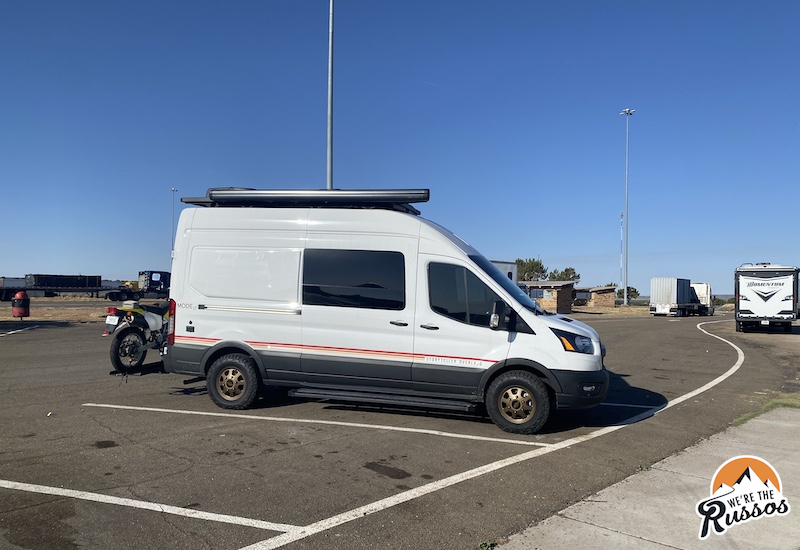
Rest Area Overnight Parking For RVs, Cars and Trucks
Some of the links below are affiliate links, which means we will earn a commission on the products or services you purchase using the links. There is no additional cost to you and the earnings help keep this website running. Read the Affiliate Disclaimer for more information.
Is overnight parking allowed at rest areas? The answer depends on the state you are traveling through. Some states allow overnight parking at rest areas and other states make it unlawful. Keep reading to see which states allow overnight parking at rest stops, how to find them, amenities, security, parking options and some of our personal experiences parking overnight at rest stops around the United States.

Rest Area Overnight Parking
Table of Contents
States That Allow Overnight Parking at Rest Stops
As of publication, these states allow overnight parking (8 hours or more) at rest stops. For the most current information and closures, visit the state’s DOT website. NOTE: there are a number of states in this list that have no laws concerning how long you can park at rest areas. That does not mean that you can stay indefinitely or that law enforcement will not check on you.
Arizona – according to the Arizona DOT website , there are no rules against parking overnight in the rest area and there are no restriction on the length of stay. The rule does specifically prohibit camping and campfires in Arizona rest areas.
Arkansas – park overnight at rest areas in Arkansas without any limitation on length of stay. The Arkansas DOT website has an interactive map where you can choose a welcome center/rest area to see if the location is open and whether there is truck parking, an RV dump station, WiFi or propane service.
California – signs posted at the California rest areas state travelers can park up to 8 hours at the rest area. The California DOT website has information about their Safety Roadside Rest Areas along with interactive maps to see rest area locations, closures, road conditions and more.
Connecticut – I was not able to find any clear information on their websites but when I called I was told that while there are no specific limits, if you’re tired and you need to stop and sleep, that is allowed. You can find a list of Rest Areas and Service Plazas on the Connecticut DOT website .
Florida – Florida Administrative Code (FAC) Rule permits a period of three hours for the general public, and a period of ten hours for commercial motor vehicle operators subject to hours-of-service regulations. Locations and information on rest areas can be found on the Florida DOT website .
Georgia – According to Georgia state law: “Nothing in this Code section shall prohibit the normal, customary, and temporary use of safety rest areas, welcome centers, tourist centers, and other property of the department or state highway system specifically designated for purposes of resting, sleeping, eating, or other similar activities by persons traveling by vehicle.” You can find the location and hours of rest areas on the Georgia DOT website .
Idaho – IDAPA 39.03.50 specifically states that “occupancy of the rest areas on interstate highways is limited to ten (10) consecutive hours. Occupancy of rest areas on other routes of the State Highway System is limited to sixteen (16) consecutive hours.” Camping and campfires are also prohibited at Idaho Safety Rest Areas. There is also an interactive map showing safety rest area locations throughout the state. Visit the Idaho DOT website or call 208-334-8000.
Iowa – I could not find any specific rules against overnight parking at rest areas and several sources claim Iowa has a 24 hour limit for parking. No camping is allowed but you are allowed to sleep in your vehicle. Iowa DOT website with rest areas map.
Indiana – park overnight at rest areas in Indiana without any limitation on length of stay. The Indiana DOT website has an interactive map of rest area locations with information on the number of car parking spaces, commercial truck parking spaces and handicap parking spaces. Other information include the year the rest area was built and the number to call travelers have any questions about parking overnight at that Indiana rest area.
Kansas – overnight parking at Kansas rest areas is allowed for one night and no more than 24 hours. Visit the Kansas DOT website for more information or call 785-296-3566.
Louisiana – there are no specific limits to parking at rest areas. A list of rest areas can be found on the Louisiana DOT webpage .
Maine – there are no specific limits or regulations around parking at rest areas. The Maine DOT does not list or maintain any information about their rest areas.
Massachusetts – there are no specific rules on how long you can park at a rest area but there are some rest areas that have signs stating there is a 2 hour limit. While the state does not maintain a list of rest areas, it does have a list of service plazas on the Massachusetts DOT webpage .
Michigan – there are no specific limits to parking at rest areas. An interactive map of rest areas can be found on the Michigan DOT webpage .
Minnesota – “Commercial motor vehicle operators subject to hours of service regulations under 49 CFR 395 may stop and park continuously, for a period of up to ten hours as necessary to comply with the hours of service regulations, at any MnDOT safety rest area or travel information center that has parking stalls designed to accommodate a commercial motor vehicle. All other motorists are permitted to stop at rest areas for up to four hours, where posted.” More information and an interactive map of rest areas can be found on the Minnesota DOT website .
Mississippi – according to the long term parking guidelines, travelers can park for up to 8 hours at a Mississippi welcome center or rest area. “If a vehicle is parked at a roadside facility for more than this time period, it may be removed either by MDOT forces or the Mississippi Highway Patrol.” Visit the Mississippi DOT website for more information and this page for the guidelines for rest areas and welcome centers.
Missouri – there are no specific limits to parking at rest areas. An interactive map of rest areas can be found on the Missouri DOT webpage .
Montana – there are no specific limits to parking at rest areas. A full list of rest areas and their amenities along with an interactive map can be found on the Montana DOT website .
Nebraska – while the rest area rules and regulations state: “Overnight camping or parking is prohibited.” They do specify that you are allowed to stay up to ten (10) hours. Visit the Nebraska DOT website or call 402-471-4567 for more information.
Nevada – signs posted at Nevada rest areas show a maximum stay of up to 18 hours. To see a full list of rest areas with a list of amenities for each and map of locations, visit the Nevada DOT website .
New Hampshire – there are no specific limits to parking at rest areas. A map of rest areas can be found here .
New Jersey – there are not a uniform set of rules for rest areas in New Jersey. Some have posted time limits while others do not. Each rest area also has specific parking rule such as on NJ 23, vehicles under 5 tons are prohibited to park from 6pm to 6am. There is a 2 hour time limit at all turnpike service plazas. Rules for individual rest areas and scenic overlooks can be found here .
New Mexico – overnight parking at New Mexico rest areas is allowed up to 24 hours. Visit the New Mexico DOT website to get up-to-date information. There is also the State of New Mexico Rest Areas Handbook which has a page for each rest area and information on the number of parking spaces, bathroom facilities, amenities, tourist attractions, comments about the rest area and an overall rating from 1-10.
New York – 10 hour limit for commercial operators and three hour limit for the general public. A full list of rest areas can be found here .
North Dakota – park overnight at a rest area in North Dakota without any limitation on length of stay. Visit the North Dakota DOT website to see a compete list of rest areas and amenities along with a list of RV dumps throughout the state or call 701-328-2500 for more info. NOTE: RV dumps are not provided at any North Dakota visitor centers or rest areas.
Ohio – there aren’t any specific ordinances against parking overnight at rest areas nor are there any time limits. The only thing that’s prohibited is camping which typically means setting up a tent or similar activity. On the Ohio DOT website , they have an interactive map of rest areas along with a link to the Rest Area Regulations.
Oklahoma – park overnight at rest areas in Oklahoma without any limitation on length of stay. Visit the Oklahoma DOT website or call 405-521-2557.
Oregon – signs posted at Oregon rest areas show a maximum stay of up to 12 hours. The ODOT rule specifically prohibits “Setting up a tent or other structure, camping, or remaining in a rest area for more than 12 hours within any 24-hour period.” Visit Oregon’s TripCheck rest area page for a map, a list of accessible rest areas, a list of rest areas with horse areas and RV dump stations.
Pennsylvania – while overnight parking in rest areas is not allowed, 2 hours max in a 24 hour period, the Pennsylvania Turnpike Authority does allow parking for up to 24 hours at the service plazas.
Rhode Island – there are no specific limits to parking at rest areas.
South Dakota – 10 hour limit for commercial operators and three hour limit for the general public. A special note, while you may sleep in your car, you may not sleep in an RV as it’s considered camping and camping is not allowed.
Texas – according to Texas Transportation Code 545.411, travelers can stay in a Texas rest area for up to 24 hours. Visit the Texas DOT website .
Utah – according to the Utah DOT website , “Utah encourages drowsy drivers to take a break. Rest areas are provided to the traveling public for this purpose. All rest areas are posted for no overnight camping. However, extended stays are permitted and are monitored by the on-site staff and the Highway Patrol.” There is also an interactive map showing the location of rest areas as well as a resource to find RV dumps.
Vermont – there are no specific regulations against parking overnight at a rest area, however the law specifically states that, “No individual shall enter or remain on any State highway facility for the purpose of overnight camping unless the particular facility has been designated for that purpose by the Traffic Committee.” Sleeping in a car should pose no issues however since camping is not defined it may be up to the discretion of the officer to determine if you’re “camping” in any type of RV.
Washington – overnight parking at Washington rest areas is allowed up to 8 hours within a 24 hour period. Commercial trucks are allowed to stay one hour long than the federally mandated rest periods. Visit the Washington DOT website or call 360-705-7000.
West Virginia – there are no specific limits to parking at rest areas. An interactive map of rest area locations can be found on the West Virginia state website .
Wisconsin – overnight parking at Washington rest areas is allowed up to 24 hours however no camping is allowed. Visit the Wisconsin DOT website for more information on rest areas in the state.
Wyoming – there’s a little debate with this state. Based on my recent conversation with a representative at WDOT and in the tourism office, overnight parking is no longer allowed in Wyoming rest areas. However, the Wyoming Rest Areas Guide has this to say: “If you need more than a nap, you can sleep in your vehicle for a longer period, but don’t pitch a tent, extend your RV’s slideouts or otherwise set up for an extended stay.” Visit the Wyoming DOT website or call 307-777-4375.
How to Find a Rest Area
Besides looking for signs on the highway, we use Allstays to locate a rest area ( Allstays Camp & RV app review ). There are multiple “Rest” filters in the app that can be applied to display all the rest areas within a certain range on the map.
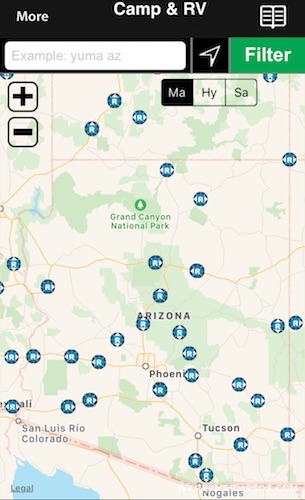
Rest areas do shut down for a variety of reasons. Pay attention to rest area closure signs or call the state DOT to confirm the rest stop is open.
State welcome centers are a good resource to get the latest information on overnight parking rules and closures.
Rest Area Amenities
Standard rest area amenities include restrooms, picnic tables, and drinking fountains. Other roadside facilities include:
- RV dump station ( how to dump RV tanks )
- Electric hookup
- WiFi ( how to boost WiFi )
- Vending machines
- Pet exercise area (Oregon even has horse areas at some locations!)
- Travel information center
- Recycling containers
You can often find a list of rest area amenities in the rest area details section of Allstays .
While the state of Alabama does not allow overnight parking at their rest areas, some rest stops do have RV dumps. The one we used in the photo below as clearly marked and free.
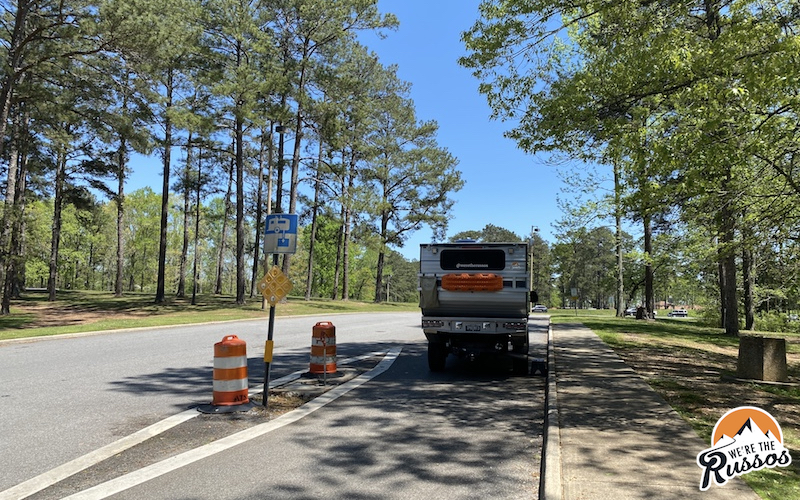
Parking Options: Commercial Trucks, RVs, Autos
Rest areas often have separate parking for longer vehicles like commercial trucks, vehicles with trailers and large RVs with clearly marked signs. These spots are marked by white lines on the ground and typically large enough to fit a commercial truck with trailer.
When we traveled in the 29’ motorhome and tow car , we always parked in the RV/truck section. Watch video of our Class A RV rest area experience .
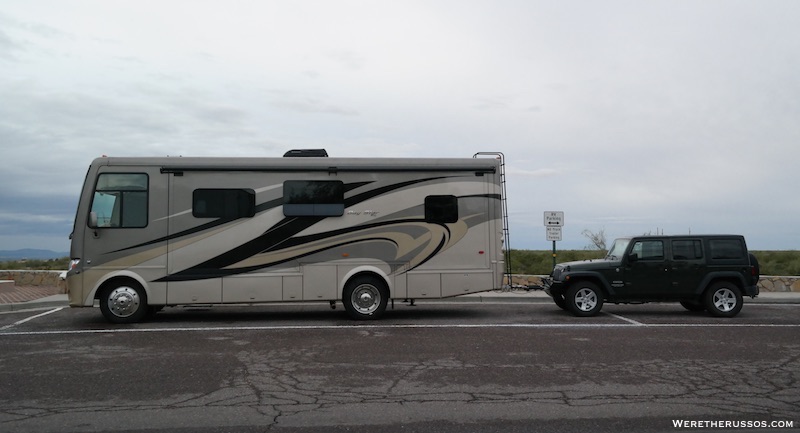
In a Class B camper van , we just pull into a parking spot in the autos section. Watch video of our camper van rest area experience .
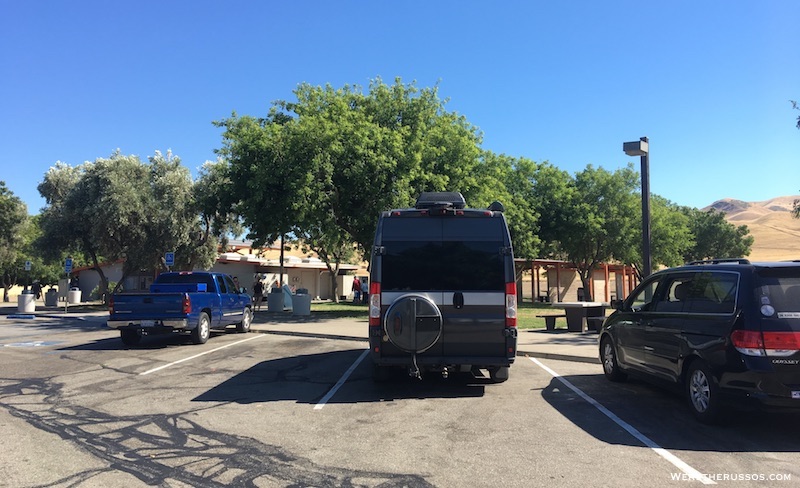
Even when we traveled in a 4×4 Ford F350 , we still fit in an auto spot at the rest area. Our most memorable overnight at a rest area was in Idaho with electric hookups. While we didn’t need to plug-in our off-grid camper , we enjoyed the well maintained space and the peace and quiet.
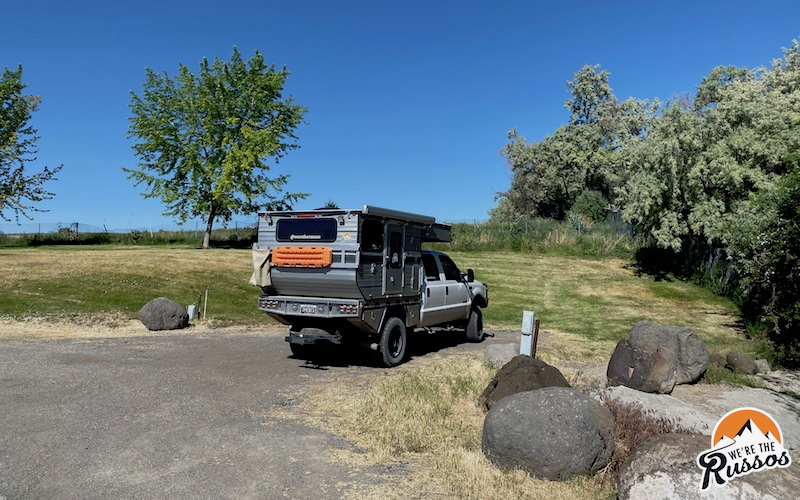
Commercial Trucks and RVs: The Debate
Whether RVs can overnight at a rest area has been a bit of a debate with truckers. The argument from truckers is similar to the reasons why they don’t think Rvers should overnight at truck stops . Since truckers can only drive for so many hours before they have to stop, they feel that the large spaces at rest areas should be reserved for them and that there aren’t enough parking spaces for them.
The counter argument from RVers is that rest areas are public places that are paid for by tax dollars – hence everyone has a right to overnight at rest areas as long as it is allowed.
That said, if you have a Class B RV, van, truck camper or even a small Class C motorhome and you’re not towing a trailer, my suggestion is to park on the car side so you’re not taking up a spot that a commercial truck could use.
Security at Rest Areas
Some rest areas will have posted signs stating the area is patrolled by security. However, it’s not something we take into consideration because there’s no way to know how often the area is patrolled.
Other signs will warn that you are parking at the rest area at your own risk.
Having spent the night at different rest areas around the country, we’ve never had a concern for safety. Check out our post RV Safety on the Road .
Our Rest Area Experiences & Tips
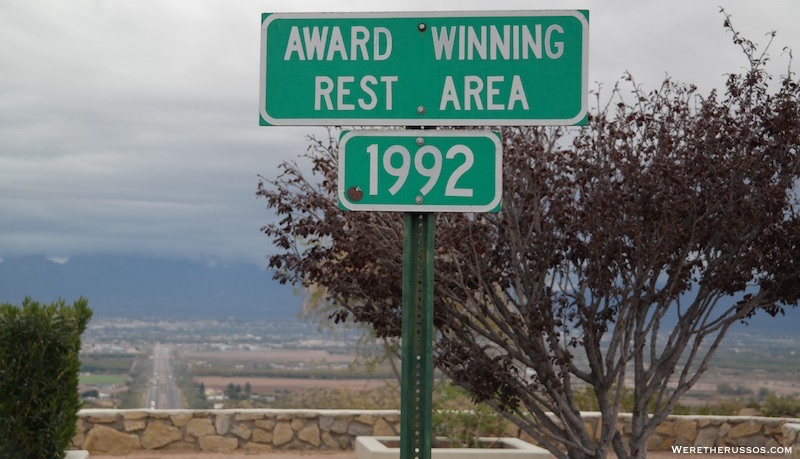
There’s nothing quite like the joy of seeing that “rest area” sign when you’re in need of a break. We’ve pulled into many rest stops around the United States and one thing we’ve learned is that not all rest areas are created equal.
The first time we spent the night at a rest area was in Las Cruces, New Mexico. This was when we thought we were long haul drivers and made an 800 mile trip in two days. The first leg of our crazy drive was from Tucson, Arizona to Las Cruces and spent the night at the rest area. We had no idea until we pulled up that it was an award winning rest area with spectacular views. If you’re driving through Las Cruces, New Mexico, stop in for a break and enjoy the views.
Since our first overnight at a rest area, we’ve spent the night in Arizona, California, Idaho, New Mexico, Oregon and Texas.
Arrive early. For the best chance of getting a truck/RV spot, arrive late-afternoon. Some rest areas are more popular than others so have a backup plan if it’s full. Since we downsized to a smaller camper, we can park in the car parking area and don’t have to be as concerned about arriving early to a rest area.
Have back up parking options. Look to see if there’s a Cabela’s , Cracker Barrel or Walmart nearby and call to see if overnight parking is allowed. Truck stops (Pilot, T&A, Loves) are another option for overnight parking, but they can also fill up quickly. Harvest Hosts or Boondockers Welcome members can check to see if there are hosts nearby.
Rest Area Closures. We’ve driven by several rest area that are closed for maintenance or closed permanently. Usually, there is a sign on the highway to notify drivers of the closure, but that’s not always the case. We have run into situations where we drive up to the exit for the rest area only to be met by bright orange cones. This is where having a backup plan comes in handy.
Pets. Most rest areas have designated pet walks. Look for clearly marked signs at the rest area.
While we prefer to camp on public land , there are those long travel days when we’re trying to get across the country for an overland event or RV show . That’s when pulling into a rest area for the night and getting right back on the highway makes this a convenient option.
Have you spent the night at a rest area? Share your experience with us by leaving a comment below.
Leave a Comment Cancel reply
24 thoughts on “rest area overnight parking for rvs, cars and trucks”.
I don’t worry about limits on rest area use in my van. I don’t camp, I don’t have a pop top or slides, I don’t put out chairs, I don’t bother people. I walk my dog, watch a movie and go to sleep. No one has ever bothered me. Besides if someone in authority did wake me up so what? I’d drive on and finish my nap at the next rest area. Just use common sense and don’t worry.
You need to update this article. I was just doing some research on WA state rest areas and all the info I came across said there is a limit of 8 hours. Thanks!
Thank you Diana – the post has been updated.
Wish there was a more comprehensive map on which rest areas have electric or not. We travel a lot from Western NY to Florida
Hello Kait, During my homeless bouts and per diem pocketing periods, I’ve overnight parked in a pickup with a camper in Alabama,Arizona,Arkansas,Idaho,Illinois,Kansas,Mississippi, Oklahoma. and Texas. Texas is where I’ve lived in rest and picnic areas for months on in without any regard for the 24 hour rule. Once a Bell County Sheriff’s deputy woke me up and ran my license for warrants. Another time, outside of Post, Texas DPS checked to see if I was okay. I was living on a motorcycle and sleeping on picnic tables. I’ve also done this in Idaho and have slept on the rest area parking lot,next to my bike, in Arizona. Georgia State Police have run me out of their rest areas but didn’t give me a ticket even though signs clearly prohibited overnight parking. Tennessee troopers made me shut the door on my truck. I’d like to get back to some heavy duty motorcycle touring, so if anyone can tell me about more states that don’t mind sleeping on the picnic tables, let me know.
I have ridden all over the states and found that sleeping on picnic tables with my helmet on safe enough during the day for hours but not over night. It all depends on the cops that night. Most just ask you do move on. At night if I need to, I sleep under a light were a cop or passer by can see what happing. I did have a cop in Indigo not let me sleep, I had just pulled up and he said I or my bike would not be there in the morning. So I try not to sleep in rest areas to near cities. Case the place, good luck.
Hello Kait – Thank you for this very helpful information. With regard to overnights at rest areas, do you think you would feel just as safe if you were traveling alone (with a dog)? Thanks.
Hi Susan, that’s a difficult question to answer because where I might feel safe, you might not. I would encourage you to read our RV safety article for some tips.
I’m considering traveling between phx and mpls during this corona virus. I plan to sleep in the car. Are rest stops open and can I sleep overnight? I will travel i40 and I 35. Please advise.
Hi Tish, the best way to figure out which rest areas are open for overnight parking is to contact that state’s DOT directly.
Hello Tish, You can do it all the way thru. In Texas you have picnic areas at your disposal also. I can list a number of other more preferable freebies, but seems like this discussion is limited to rest areas. Worst that can happen to you is being checked for warrnts and told to leave.
I like to know about overnight parking on the east and west coast for a Class C RV
Kevin, have you checked out our RVing resources post ?
Long haul trucker here. I dont want to hate on RVs, but you guys have more access for places to park than we do. We work on the road, have hour restrictions, and need places to park. So many times I pull up to where I plan to rest for my 10 hour break, and half the spots are taken by RVs. I’ve started driving overnight, which is not safe, hard for me to stay awake, but there are more places to park during the day then at night. Truck stops are already pretty full, we end up parking on the street, which many of our companies ask us not to do because this is illegal in most states. All I ask is try and share the spots, if theres an RV park where you chose to stay, please pick the park over the rest areas. Thank you.
I agree. I’m an RV er. I go to a campground when possible. Now though most campgrounds are closed due to covid 19. So you may see me there so please understand. What gripes me the most is all our needs move by trucks. I spent my life helping to build interstates . There should be plenty of spots for interstate travelers. If our country can load down these highways we should have lots of spots to park trucks and RVs at night. This is a no brainier. This shouldn’t even be an issue. The private business are expected to provide for the state.
Please pick another job if your going to cry about parking.
I’m an almost 70 year old woman living alone, full time, in an RV, to save money. I’m blessed to have lots of friends/family where I can move place to place & stay in their yards w/o overstaying my welcome. I’m glad to see a trucker on here. I truly get it. And I don’t ever park in a DESIGNATED truck area, and don’t believe any RV’s should, as I recognize y’all need those spaces. I don’t have the $ to spend on campgrounds. When traveling I stay in 24-hr Walmart’s, Cracker Barrel’s & Rest Areas. Most rest areas have separate Truck & RV areas. HOWEVER last Christmas Eve night I stopped for the night in the Mississippi I-20 west-bound Welcome Center rest area (just east of Meridian). The signs entering VERY CLEARLY sent trucks & RV’s to the SAME parking spots. I parked, settled in, and stayed the night. I had AS MUCH right to be there as any truck. The next morning I woke up to find multiple SLASHED tires! I had to replace 3 very expensive tires. One was an inner tire I didn’t realize was even involved until I later had a blow out. The knife stabs went all the way into the tires. I believe whoever the person was that did this is evil. Honestly. AND I also believe they do not represent the majority of truckers, who I find to overall be ‘good folk’. Yet mine is not a lone situation. I‘ve heard of air being let out of tires (bad! yet not pure evil like slashing); 5th wheel trailers disconnected from their truck in the night, RV sides being ‘keyed’, even when not marked as a Truck Area Only. So there IS a two-way street here. I should not have to pay money for a campground (any more than truckers should have to pay for a motel) when there is a LEGITIMATE spot I’m allowed to be in.
Hi Kait, Are there any good overnight places on I95, I10 or I75 that you’d recommend?
It depends on what part of the country you are in. Do you have Allstays ? The map will show you all the different options available including truck stops , Walmarts , rest areas, etc…
. Hi guys hope all is well with you and your travels I would like to know if there are any rest areas in the state of Arizona I would like to know if there’s any rest areas in the state of Arizona where they allow you to stay overnight I do not have a camper just a regular car which is really comfortable let me know because I am traveling East so I will also be going through Texas Mississippi Louisiana I appreciate your response take care of you safe thank you thank you thank you Dennis
Hey Dennis. Arizona permits overnight parking in their rest areas. Our preferred way to find a nearby rest area is to use AllStays .
….we discovered rest stops long ago we are spending new the night at one now outside Dublin Georgia, rest stop 88 which has about 15 truck spots, clean rest rooms and a dump. I feel they are much safer than any Wal-mart if indeed you can that will allow you to park and it’s not always easy on and easy off and most of the Cracker Barrel restaurant we have tried did not have adequate parking so for the in between 1000 trails, KOA, Elks clubs etc, this is us!!
You certainly hit the nail on the head with rest areas being so different. The state whose rest areas frustrate me the most are Arizona. This is entirely due to the random nature of which ones they will have open or closed and the lack of rest areas on I-40. My worst experience at rest stops has been in CA. The rest area problems have always been in area close to or in large cities. Thanks again for your insights!!!! Neal
You’re welcome Neal! Glad you enjoyed the post. We have also seen quite a few closed rest areas in CA.

- New RVers Guide
- Travel Guide
- Campgrounds
- Boondocking
- National Parks
- Free Camping
- Essential Gear
- Cost of RVing
- One-on-One Coaching
Interstate Rest Areas
Rest Areas along Interstate Highways
Overnight Parking Rules
Some states allow weary travelers to sleep in their vehicles as long as needed; others place a time limit on how long you should stay. Time limits are not generally strictly enforced unless there is reason to believe the rules are being abused.
Camping is not permitted in any rest area. Camping is generally defined as setting up a tent or sleeping outside of your vehicle. Sleeping in your RV is not considered camping. There are, however, some rest areas in Oregon and Montana that provide access to a state park or national forest in which camping is permitted. Also, overnight RV parking spaces are available in service areas along Ohio’s turnpike; a small fee is charged.
If you have specific questions regarding rest area usage rules, please contact the state’s DOT office; don’t contact us as we cannot assist you.
Below is a summary of each state’s rule regarding overnight parking. For a more in-depth analysis of overnight parking at rest areas, refer to the following article on RV Hive .
Page Last Updated: September 23, 2019
- No overnight parking or camping.
- Overnight parking permitted; no camping.
- Overnight parking for safety reasons only; no camping
- There is an 8-hour stay limit. No overnight parking or camping.
Connecticut
- There is a 4-hour stay limit. No overnight parking or camping.
- There is a 3-hour stay limit. No overnight parking or camping.
- There is a 10-hour stay limit. Overnight parking permitted. No camping or sleeping outside of vehicle.
- Overnight parking is limited to one night with extenuating circumstances; no camping or sleeping outside of vehicle.
- Overnight parking is limited to one night; no camping.
Massachusetts
Mississippi.
- Overnight parking permitted. No camping or sleeping outside of vehicle.
- There is a 10-hour stay limit. No overnight parking or camping.
- There is a 24-hour stay limit. Overnight parking or camping permitted.
New Hampshire
- There is a 4-hour stay limit unless emergency conditions exist. No overnight parking or camping.
- Limited overnight parking; no camping.
- There is a 24-hour stay limit. Overnight parking permitted. No camping or sleeping outside of vehicle.
- There is a 3-hour stay limit (4 hours on the Thruway). No overnight parking or camping.
North Carolina
North dakota.
- Overnight parking allowed; no camping.
- There is a 3-hour stay limit. No overnight parking or camping is allowed. Overnight RV parking permitted in some areas along the Ohio Turnpike.
- There is a 12-hour stay limit. Overnight parking permitted; no camping.
Pennsylvania
- There is a 2-hour stay limit unless otherwise posted. No overnight parking or camping.
Rhode Island
South carolina, south dakota.
- There is a 2-hour stay limit. No overnight parking or camping.
- There is a 24-hour stay limit. Overnight parking permitted; no camping.
- No overnight camping. Extended stays are permitted and are monitored by the on-site staff and the Highway Patrol.
- There is an 8-hour stay limit. Overnight parking permitted. No camping or sleeping outside of vehicle.
West Virginia
- Camping is prohibited at rest areas, but drivers who need rest to safely continue their travels can sleep in their vehicles in the parking lots. The National Sleep Foundation recommends a nap of 15-20 minutes to improve alertness and driving skills. If you need more than a nap, you can sleep in your vehicle for a longer period, but don’t pitch a tent, extend your RV’s slideouts or otherwise set up for an extended stay.
50 thoughts on “Overnight Parking Rules”
IF THEY RECIEVE FEDERAL MONIES THEY SHOULD “ALL” ALLOW AN OVERNIGHT REST.
Rest areas are managed by each state’s Department of Transportation. I’m uncertain whether federal money is provided to the states for the maintenance and day-to-day operations.
Well 2/3rds of the country don’t allow overnights. I find that sad.
Tomorrow, we’ll be heading out on our 4th trip xc with our camper since covid hit. Before that, the 4 of us – 2 humans, 2 dogs – were stopping at hotels. Campgrounds are expensive for the few hours and our small needs, plus not safe covid-wise in our minds. I discovered this site by happy accident and it’s been so helpful. We’ve been staying in rest areas, service plazas, and once by happenstance, a tree-lined Walmart parking lot. Truckers have been respectful, as we have been to them by not taking away parking space from them. No one has ever hassled us as we’ve stayed overnight. Some city parks have water/elec hookups for rvs for a small fee ~$12.
I’ve found you can often sleep in your vehicle overnight with no hassles — regardless of state limits. However, overly-restrictive rules give LEOs a basis to harass you if they feel like it. That’s not right. Law-abiding citizens should be left alone if they get tired and fall asleep in a rest stop during a long drive.
Thank you for the information on this website.
Well if the rules allow LEOs to “harass” you as you call it then you are not law abiding in that situation are you? your desires are not above the rules or the function of LEOs.
LEO’s if they have any brains at all, would feel like they need to protect and serve,, and kicking a tired driver out of a rest area, needs a life.
Been traveling an sleep in rest stops for years, never knew rules an never was bothered. With covid situation, I haven’t travelled but I would think if you keep low profile you’d be ok
Search the boondocking videos. In Nevada there are places that help houseless, not homeless people with a place to receive mail so you can have a drivers license. Need to check states in youtube videos ,cheaper living. Bushcraft has some interesting ideas.
I would bet you ANYTHING that the ultra-short time limits some states have is because of pressure from the hotel/motel industry in that state–they’d rather have somebody rent a room for $100 or more instead of them catching a few Zs in a rest stop!
It’s more about crime and prostitution prevention than anything.
My wife and I are homeless. I got injured and was unable to return to work. My wife lost her job due to Covid. We lost our apartment and had to put all our furniture in storage. We bought a 1991 Chevy conversion van. She looks beat up but her engine is completely sound, 86,000 original miles. She was in storage for 13 years. We’re barely getting by on unemployment. Anyways, living in California, homeless and in your vehicle is an absolute nightmare. All the campsites have been closed due to restrictions we are forced to find spots to park in and sleep. Sleeping in your car in California is illegal. We have been rousted by local authorities and received several citations. There’s only one rest spot in our area. There’s an eight hour limit but our van is recognizable, and CHP know we frequent the spot. We have spent many nervous sleepless nights waiting for them to knock on the window. I feel ashamed because it’s people like us that cause the state to make rules such as “no overnight parking.” We just really are trying to get back on our feet but it is a struggle. I want to apologize to all my countrymen, I love this country and I love to travel we appreciate rests spots and places that are peaceful. But somethings got to change for those who have fallen.
So sorry to hear your story. Exceptions should be made. If I were the CHP I wouldn’t have the heart to knock on your door and make you leave. I hope your luck and opportunities turn for the better soon.
William Shatner, the famous actor, lived in his car for three months after “Star Trek” was canceled. The CHP should leave people alone who aren’t hurting anyone. Shame on them!
Mr Broken, I read about your situation and want you to know that someone as far away as Georgia cares about you in his praying for you and your wife. I pray that God blesses you through this trial and that you both move closer to Him. Please know that He will never abandon you if you call out to Him!
Move to Slab City, no more hassle.
So, in California you can’t sleep in your car, but it is okay (not enforced) to sleep on the concrete under an overpass or bridge. Sounds about right.
This is so sad.The system was broken before the Pandemic and now it is even worse.I am sorry you are going though this. By the grace of God, I still have work and still have a place to live.
God bless you and your wife, I hope things get better for you very soon!
I’m very sorry for your situation, you are not alone. You might consider leaving CA. selling your stored stuff. Get SD residency for tags DL etc. Nearly all banks use online apps , so access to your $ should be easy. Not sure if you are on assistance of any kind. If you are maybe moving your residency to SD will open up assistance there. You and your wife have a tough row to hoe, yet have the blessing of your camper van. One thing for sure , it sounds like you are stuck in a vicious circle where you are. Even if you have to drive in short distances, getting away from where you are might open doors for you. You could consider asking for help at food banks along the way, I have no idea of their rules, but it is worth asking. Churches also . There is always something good in the bad things that happens to us. May GOD bless you and your wife with wisdom and fortitude to step out and find a better life.
Your wife should be easily employable now, but if not and you are disabled SSI is $841 a month. What has to change is you. Only two states are more expensive to live in than California making so many homeless it is impeding the quiet enjoyment of public spaces. There are still places in the Midwest where one can rent an efficiency apartment with utilities included for $500 a month. SNAP food assistance supplement estimate for two is $319 a month with those parameters.
I have recently (2020) stayed overnight in rest stops in AZ, UT, NV, CA, OR, WA and UT in my truck camper. Regardless of the posted overnight rules I never had a problem.
Now wa postex 4 hr and even 1 hr stay limit no 8 hr spots wtf
I agree with here these time limits seem a bit too much! I personally never heard of these time limits. do rest areas post them somewhere??? I always thought rest areas were for those who are traveling to stop for bathroom, picnic eat, stretch and sleep. open 24/7 so what ever time you need you take. Seriously think these time limits are crazy and simply stupid taking into consideration what I thought they are meant for.
I agree so much. I think the “no overnight parking” and a lot of the time limits are totally ridiculous. What are rest stops for ? They are for weary travelers to pull off into a safe location and get the rest they need to continue their journey. No wonder there’s so many people who drive tired and risk falling asleep at the wheel. I’ll remember not to travel through the states that have ridiculous rules for rest stops.
It sounds like a system that is about to shut down. Don’t be surprised if you see a chain across the gate of a lot of these rest stops this time next year. This sounds similar to the death rattle of a lot of retail establishments; all the amenities disappear one-by-one until one day, the place suddenly folds. The restrictive time limits are probably designed to motivate people to zoom right through their state to an adjacent state, if said people are unwilling (or unable) to rent a motel room. I wonder if anybody makes a connection between otherwise sober people swerving off the road (or into oncoming traffic) and the general lack of usable rest areas? It might make an interesting correlational study.
I thought so too, but maybe there were people who Abused it as usual, and then Rules Change and is Not good for a lot of good people who need it, a lot of times there are those parasites of Society that ruin it for everyone else.
I’ve traveled back n forth from coast to coast in the 90’s and we slept at most rest-stops, larger well lite gas stations, nicer hotel and mall parking lots in some cases. Never had an issue back then. However, I would always drive straight through to Florida, once leaving Texas because interstate 10 is better to drive during the day. I’m about to become a traveler again and see the country, so this site has been very helpful. Thanks Admin!
Quiet, peaceful place to stop with lots of spaces dedicated to RV parking. Green space was a bonus for dog walking, and ample trash cans to dispose of waste. Oh and the best part is a separate “big truck “ parking area. Thanks Cabela’s your store is awesome!
We’ve only slept in rest areas one time in the spring of 2019. We were in Texas headed for Arizona. A high wind advisory was issued for 40-60mph winds starting in 12 hours with even higher winds in a western TX state park where we were planning to spend the night. Our NM stop was Rockhound state park which has exposed sites on the side of a hill/small mountain.
So we drove straight through for 26 hours to outrun the wind which was moving west from central TX to CA. We stopped to sleep several times for 2-3 hours at rest areas in NM and AZ. We tried to find spots between two trucks to help block the wind.
We managed to get to Phoenix several hours before the wind hit there.
Very helpful. Thank You.
Most states are more concerned about hotels and campgrounds losing money than you saving yours.
Money or life??
There is a 10-hour stay limit. No overnight parking or camping. – does not make sense! so 10-hour stay only during the day???? It is overnight most of us want.
Seems biased against us that travel on motorcycles. How do you sleep “in” a Harley? I have an artificial leg and have to take it off for even short naps. Might have to consult the Americans With Disabilities Act.
You need to address your concern with the individual State Department of Transportation office. This site only provides information about the location of rest areas. We are not associated with any official DOT office.
Bull crap!! This is America. We pay federal taxes and deserve the most from our country. Hey real administrator.
If you have issues regarding each state’s overnight parking rules, you’ll need to contact the DOT office of each state. This website is not a DOT office and cannot address such concerns.
These seem harsh and archaic.
I’ve been in so many rest areas through out life, if you are tired, sleep, then leave. I believe they just don”t want you there for a day or two.
I would think taking a break/overnight sleep amongst the truckers doing the same thing would be accepted anywhere. After all it is a “rest stop”
WTF is up with Tennessee’s 2 hr max??? That’s just plain mean – not even enough to seriously get in a nap by the time you use the restroom and settle in for a tiny nap (need to allow time to figure out proper ventilation for the climate, block out light sources, etc.). Nonsense and just asking for fatigue-related accidents. Do some science based studies, Tennessee.
When we move to TN next year, we will set them straight! LOLZ.
I stated 1 for 12 hours in Tennessee last night no issues no problems
We slept overnight in our car overnight abou 7 hours . It was great no one bothered us but on state list it On internet stated no overNight parking but we needed sleep . At that time did not know rules. Liked it because we had 24 access to restrooms etc..
Jdaisy, I seriously think that is because Stupid People used to get drunk and Go there, to Rest Stop, well, to act Stupid and mess it up for the travelers and sleepers who just needed to stay there for rest and relaxation before taking the road again.
I would think that if you’re tired and need about six hours sleep to continue your journey most officials if not all would not bother you in your car or a camper while you’re getting your rest to move on in the morning? I have experienced this to be true in most rest stops I have stopped in for a quick 6 hours of sleep.
Leave a Comment Cancel reply
Save my name, email, and website in this browser for the next time I comment.

Can You Sleep in an RV at Rest Areas Overnight? (state list)
RVers often drive cross country to their next destination. But if you can’t find a campground along the way, or just want to save money, can you sleep in a tow camper at a reststop?
When deciding to sleep in a towed camper at a reststop, generally, camping is not permitted, but simply sleeping in an RV is allowed. The difference between the two activities would include the use of a generator or any outside entertainment or cooking.
But state laws vary significantly! So the answer could be different in different places!
From understanding state laws regarding overnight stays at rest stops to finding the best places for parking with a camper, we will cover all of these topics and more so that you can make an informed decision about sleeping in your tow camper at a reststop.
Table of Contents:
Finding the right rest stop for overnight stays in your tow camper, understanding state laws regarding overnight stays at rest stops, is sleeping in a camper at a rest stop considered camping, what states allow overnight parking in rest areas, what’s the difference between a rest stop and a truck stop, do you park with a camper in truck or car parking at a rest stop.
- Can you sleep in an RV at truck stops?
Can you stay overnight at a rest stop in North Carolina?
Can i sleep in my rv on the side of the road, can you sleep at a rest stop in california.
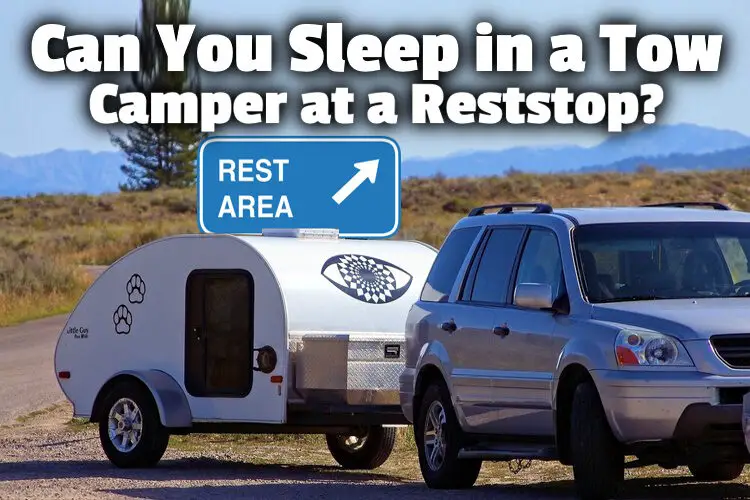
When you’re out on the open road in your travel trailer or fifth wheel (or motorhome for that matter), finding a safe and comfortable rest stop for an overnight stay can be tricky. Knowing what to look for when selecting a rest stop is key to having a pleasant experience.
To ensure a pleasant overnight stay while on the road, it is important to be mindful of what to look for when selecting an appropriate rest stop.
Prioritize safety first when selecting a spot to rest for the night; stay in areas with lots of people and good lighting, avoiding any suspicious behavior. Look for well-lit areas with plenty of other people around so that you feel secure. Make sure there are no suspicious characters or activity going on before committing to staying at any particular spot.
Amenities available will also play an important role in choosing where you want to sleep.
If possible, try and find one with restrooms nearby so that you don’t have far walk if nature calls during the middle of the night. Additionally, check whether there are any restaurants or stores within walking distance – this could come in handy if you need something during your stay but don’t want to drive too far away from the parking area.
It’s also wise to research state laws regarding overnight stays at rest stops before parking up anywhere as they may vary depending on location – some states allow it while others prohibit it altogether.
And don’t worry. Below, I’ll go down the list of states that allow it.
It pays off in spades knowing what rules apply wherever you decide park up – even if just temporarily – so make sure do due diligence beforehand and avoid any potential fines or hassle down line by checking local regulations ahead time.
Finally, keep in mind that sleeping in a camper at a rest stop isn’t necessarily considered camping; rather, it’s more akin to boondocking in a parking lot which means free camping without hookups (electricity/water).
Walmart parking lots or a church parking lot can also be great places to boondock.
And of course, there’s also dispersed or dry camping which is similar to boondocking but often done on public land such as national forests.
This type of setup typically doesn’t require permits like traditional campsites would so it is worth considering as an option when looking for places to stay on a long-term basis as the cost savings can add up quickly over time.
Finding the right highway rest areas for overnight stays in your tow camper requires careful consideration of state laws and regulations, as well as an understanding of the amenities available at each location. Once you have the necessary info, you can then ensure that your stay complies with all regulations while also being secure.
It’s also worth mentioning that unlike rest areas or welcome centers, picnic areas generally don’t allow overnight parking.
When it comes to overnight stays at rest stops, understanding state laws is key. Every state has its own regulations when it comes to parking and camping in rest areas. It’s important for RVers to familiarize themselves with the rules before setting out on their journey.
In certain states, such as Arizona and California, no time limit is imposed on the duration of a stay at rest areas or for parking campers.
In certain states, there may be regulations that impose a maximum duration of occupancy in one place—for instance, 24 or 48 hours—or necessitate relocation of the vehicle after some period. Additionally, some states may prohibit overnight stays altogether.
It’s also important to note that not all rest stops are created equal; some offer amenities like restrooms and vending machines while others simply provide a place for travelers to take a break from driving without any additional services available.
Knowing which type of stop you’re dealing with will help ensure that you comply with local laws regarding overnight stays at rest stops.
If possible, research ahead of time so that you know what kind of restrictions each state has in place before arriving at your destination—it could save you from getting stuck somewhere where an extended stay isn’t permitted.
You can usually find this information online by searching “rest area laws [state]” or calling the relevant department of transportation office for more details if needed.
It is important to understand the state laws regarding overnight stays at rest stops before planning a trip in an RV. As such, it’s necessary to consider whether sleeping in a camper at a rest stop constitutes camping or not.
Sleeping in a camper at a rest stop is not considered camping.
Camping is typically seen as an outdoor recreational activity, while overnight stays at rest stops are more about driver safety and fatigue.
Most states allow you to sleep in your vehicle for up to 24 hours when staying at a rest area, picnic area, or travel information center. Though it’s important to keep in mind that camping gear and generators should not be used while at the rest stop, picnic area, or travel information center.
When stopping for the night at a rest stop, make sure you choose one with adequate facilities like restrooms and water sources nearby. Additionally, check with local authorities regarding any rules or regulations they may have regarding overnight parking before you settle in for the night.
Some states even require RVers to pay fees if they plan on staying longer than 12 hours or using certain amenities like dump stations or showers located onsite.
It’s also important to keep noise levels down when sleeping in your camper at a rest stop so as not to disturb other travelers who may also be there taking advantage of the free parking spots available after dark.
Make sure all lights are turned off by 10 pm and try not to leave any trash behind either; this will help ensure that everyone has an enjoyable experience while visiting these areas throughout their travels.
Sleeping in a camper at rest stops is considered camping, however, it is important to research the local laws and regulations before doing so. Moving on from this topic, we will discuss what states allow overnight parking in rest areas.
When it comes to rest area overnight parking, a few states permit campers and RVers to stay for a limited duration. States, where it is legal to park your camper or RV at a rest area for up to 24 hours, include:
- Mississippi
- North Dakota
- Pennsylvania
- West Virginia
For RVers and campers traveling cross-country, state rest stops provide a great option for an overnight stay without the hassle of dealing with camping fees or having to adhere to check-in times or make reservations.
This can be a great advantage in terms of both time and money, while still offering the comforts necessary for an enjoyable rest.
It’s important however that before stopping off at any given rest area that you familiarize yourself with the local laws regarding overnight stays.
Each state is different so it pays off to do your homework ahead of time so there are no surprises when you arrive.
In most cases, a stay of fewer than 24 hours is typically permissible. It’s also worth noting that sleeping in your vehicle at a rest stop does not qualify as “camping” per se since camping might involve:
- The use of generators
- The use of leveling blocks
- The use of awnings
- Utilizing outdoor entertainment options
- Setting up a fire pit
Legally speaking, it falls under taking advantage of roadside amenities such as bathrooms showers etcetera rather than actually “camping”.
Also consider that since you are legally considered to be sleeping in your vehicle, it might be a good idea to lay off drinking alcohol. Depending on where you’re at, it is possible to get a DUI in a parked RV .
Rest stops and truck stops are both places for drivers to take a break from their travels, but they have different purposes.
Rest stops provide basic amenities such as restrooms, vending machines, picnic tables, and occasionally information kiosks or pet areas. They are typically located on major highways and serve travelers of all types including RVers and car campers.
Truck stops, in contrast, are tailored to professional truckers.
These facilities offer much more than just restrooms; they often include showers, laundry services for RVs and semi-trucks, convenience stores stocking snacks and energy drinks specifically designed for drivers on the road, 24-hour restaurants catering to long-haulers’ needs, as well as motel rooms or sleeping cabins so that exhausted drivers can catch some z’s before continuing their journey.
The size of these two types of locations is another difference between them:
Truck stops tend to be larger than rest areas because they need enough space for large trucks to maneuver around safely without blocking traffic flow. This means that there is often more room at a truck stop than at a rest area for additional services like those mentioned above.
Finally, it is essential to be aware that certain states do not permit overnight parking in rest stops, while others may.
It is best to check your state laws before planning an overnight stay in either type of location. On the other hand, many states will allow you to park your camper at a designated truck stop if you are traveling through the area during regular business hours; however, this varies by state.
A rest stop and a truck stop diverge in that the former gives motorists a chance to take pauses, while the latter caters mainly to long-distance truckers with its services.
Moving on from this point, let’s explore whether you can park with your camper in a car or truck parking at a rest stop.
Generally speaking, even large RVs will still be considered a “car” when it comes to choosing between the 18-wheeled truck area and the car area.
While obviously much larger than most cars, most RVs are still considerably smaller than big rig trucks.
When parking a camper at an overnight stop or welcome center, take care to observe the applicable rules and regulations. When parking a camper, it is important to choose the right spot depending on its size and avoid taking up more than one space.
If there are multiple spots for both small and large vehicles, make sure to use the appropriate one and not take up more than one space. It’s also important to remember that rest areas are not campsites; therefore it is best to limit extra space taken up when parking overnight.
It is especially important for those who have smaller campers such as tow campers or pop-up trailers, to pay attention when parking at truck stops as these spaces are primarily reserved for commercial trucks coming and going throughout their travels.
Even if there isn’t any signage indicating this fact, always respect these rules so that they can continue with their journey without interruption from recreational travelers like yourself.
If you find yourself parked next to an 18-wheeler while camping overnight in a rest area, don’t be alarmed.
Truck drivers understand what it’s like trying to find somewhere safe and comfortable enough for an overnight stay during travel – just make sure not to block them in if possible by leaving plenty of room between your camper and theirs so they can easily get back on the road again once rested.
In addition, some states may have specific laws regarding RV stays at rest stops which should also be taken into consideration before settling down for the night.
Make sure you know exactly where you’re allowed (and aren’t) allowed before setting up shop as some locations may require special permits or fees in order for RV owners/renters/campers etc., to stay longer than 24 hours at a time – even if no signs indicate this rule exists.
Frequently Asked Questions
Overnight stays are not permitted at North Carolina rest stops.
Camping and/or sleeping in rest areas is prohibited in North Carolina, as mandated by the NCDOT. No motor vehicles or trailers are allowed to be left without authorization from NCDOT for over 24 hours.
Therefore, RV owners and renters should plan their stops accordingly while traveling through North Carolina.
No, you cannot sleep in your RV on the side of the road.
It is unlawful to station a recreational vehicle or any other motorized conveyance on open streets and byways. It may be prohibited to camp off the beaten path without consent from a proprietor in certain states.
To stay safe and legal while camping with your RV, always check local laws before setting up camp for the night.
Rest stops in California are a great place to take a break from driving and get some rest. Stops are open 24 hours a day, and you can stay for up to 8 hours.
However, camping is not allowed, and you must remain inside your vehicle during your stay.
California rest stops provide a safe place to take a break from the road. They are well-lit and monitored by police officers or state troopers, so you can feel secure while you rest. Many of the stops have restrooms, vending machines, picnic tables, and other amenities that make them an ideal spot for travelers.
How does staying overnight at a rest area differ from a campground?
Campgrounds are private property and generally have their own rules.
They are great places typically with a lot of amenities you won’t find at a reststop. They may have pools, laundry, restaurants, game rooms, etc. They also usually have security guards too.
But for all of that, you will typically pay between $40-80 per night (or more for an RV resort).
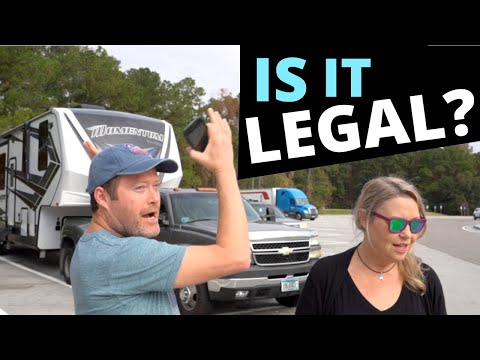
In conclusion, sleeping in recreational vehicles at rest stops can be a great way to save money on lodging while traveling.
It is important to check the laws and regulations of the area you are visiting before doing so, as some areas don’t allow it. But most do. But while some states allow up to 24 hours, others like California have maximum time limits of 8 hours.
Additionally, it is important to be aware of your surroundings and take necessary precautions to ensure your safety.
If you are comfortable with the idea of sleeping in a tow camper at rest stops, it can be an enjoyable and cost-effective way to get a good night’s rest.
Generally, with a little common sense, rest areas right off interstate highways are easy, safe, and a great place to stay when you’re on a long road trip and are ready to crash for the night. And the parking lot lights can help keep you safe. Just make sure to close your blinds and lock your doors.
Image by Clker-Free-Vector-Images from Pixabay and Image by Mike Goad from Pixabay
IDOT expects to fully reopen I-74 rest area in the next few months
Repairs are ongoing at an Interstate 74 rest area between Peoria and Bloomington-Normal that’s been closed for more than a year, but a full reopening isn’t expected for a few months.
The Mackinaw Dells facility on the eastbound side of the highway has been limited to truck parking since April 2023, with multiple road signs and barriers alerting motorists that the restrooms are unavailable.
The Illinois Department of Transportation cited an undisclosed “sewage issue” as the reason for closing the building.
The rest stop is about two miles east of the Goodfield exit. The westbound facility has not been affected by the closure.
An IDOT spokesperson said improvements at the site started earlier this year, and the adjacent lagoon west of the rest area has been emptied.
The spokesperson said IDOT anticipates the work will be completed and the rest area fully reopened in November.


COMMENTS
If you need to find a place to stop for the night, it helps to know the price and if there are any overnight parking rules. Some RV parks can be $30 or $40 or night, but if you are just stopping and heading out early, this may be too much to pay. There is also the option to stay at a rest stop. Rest stops are different all across the country.
This is great for staying overnight, but not so great for safety. So, like Tip #3 above, pick a rest area in which you feel safe. If you do, it is unlikely you will get the dreaded 3a.m.-knock-on-the-door telling you to move on. If other travelers and truckers are staying overnight, you will likely be just fine.
Nevada: Nevada allows vehicles to park for up to 18 hours (in a 2-week period) at rest areas, some of which even have dump stations for RV use and/or designated overnight RV parking spots. New Mexico: The Land of Enchantment wants you to stay rested and relaxed while on your journey. The state allows vehicles to park at rest stops for up to 24 ...
RVers can use gas-fueled stoves and a few rest areas have a dump station; otherwise dumping is not permitted. Delaware: You can park overnight at the state's two rest areas: There is a 6-hour time limit at the rest area on Highway 1 and an 8-hour time limit at the Interstate 95 Welcome Center truck and RV parking lot.
In fact, some states do not allow overnighting at rest stops in your RV. While all rest areas are meant for short rest stops, and not camping out in your RV (especially not in a tent), many rest areas do allow you to sleep in your vehicle. These places often have a 10-hour limit on how long you can stay. If you're tired and really need to ...
RVs and rest areas. If you travel in an RV, rest areas can be particularly appealing for a night's rest. The question of whether it's legal to park an RV overnight at a rest stop isn't always straightforward and can vary by location. Overnight parking regulations differ from state to state. While some states allow overnight RV parking at ...
For drivers of large RVs or trucks towing travel trailers or fifth wheels, rest areas are a breeze to enter, exit, and park. Rest areas usually have facilities such as restrooms, picnic tables and shelters, and dog walking areas. Some have playgrounds, travel information, and vending machines. A few even have charging stations for electric cars.
Remaining in a rest area for a period of time longer than that established by the Idaho Transportation Department. Occupancy of the rest areas on interstate highways is limited to eight (8) consecutive hours. Occupancy of rest areas on other routes of the State Highway System is limited to sixteen (16) consecutive hours.".
The majority of states allow drivers to sleep overnight at rest stops. However, it is imperative that you check local restrictions or any signs posted at the rest stop. There are almost always time limits of one night or 8-12 hours. California: Drivers are subject to an 8-hour limit within any 24-hour period.
Most Cracker Barrels are RV-friendly, with specific free RV parking areas and 24-hour supervision, which can be particularly appealing to women traveling alone. While not as common as Walmarts, a Cracker Barrel does not ask you to 'check in' or phone anybody before staying there. ... Search ahead of time to find out which rest areas have ...
RV Life Trip Wizard, formally known as RV Trip Wizard, you'll find campgrounds, reviews, food, shopping, rest areas, attractions, and much more through this 3-in-one app. Members also get the Maintain My RV app that tracks all maintenance and repair work completed on your motorhome or travel trailer.
Overnight RV Parking at Rest Areas and Truck Stops. Rest areas and truck stops are conveniently placed, highly-accessible locations for overnight RV parking. Typically located adjacent to major thoroughfares, these locations are built to accommodate even the largest of rigs. Don't assume, however, that overnight RV parking is permitted at all ...
Planet Fitness. Some Planet Fitness locations allow RVers to park overnight if they have a membership to the gym. It's a great place to park for the night as well as get a workout in the morning! 25. Harvest Hosts. Harvest Hosts is by far our favorite free (or almost free) overnight RV parking location.
The designated parking areas are open for occupancy for a one-night stay and are available on a first-come, first-served basis. RV parking areas offer electrical outlets (20 and 30-120V; 50 AMP-240V), a wastewater dump station for black/grey water tanks and potable water filling station, all for a $20.00 fee.
Use an excellent routing and trip planning app like RV LIFE Trip Wizard and the RV LIFE App. to find rest areas and other points of interest on your route. RV Trip Wizard. Trust Your Gut. 2. It's always best to trust those funny feelings you get about places. If a rest area looks sketchy, don't stay there. The next one won't be too far away.
Rest Area Parking Limit. California. 8 hours. Delaware. 6 hours only at Smyrna Rest Area. Florida. 10 hours for truckers, 3 hours for RVs/cars. Idaho. 10 hours are allowed at Interstate rest areas, with a 16-hour allowance on other highways.
Wyoming. "Camping is prohibited at rest areas, but drivers who need rest to safely continue their travels can sleep in their vehicles in the parking lots. The National Sleep Foundation recommends a nap of 15-20 minutes to improve alertness and driving skills.
Overnight RV Parking at Rest Areas. Usually, every rest stop has a sign stating that no overnight parking is allowed. But that restriction often interferes with the stated allowed periods you are allowed to stay in a rest stop. Some states have an extended amount of time which if you arrive at the right moment, can last all night.
A full list of rest areas can be found here. North Dakota - park overnight at a rest area in North Dakota without any limitation on length of stay. Visit the North Dakota DOT website to see a compete list of rest areas and amenities along with a list of RV dumps throughout the state or call 701-328-2500 for more info.
Easy Steps to Dumping RV Waste. Follow the steps for rest stops with RV dumps. The following are simple steps to dumping your RV waste. 1. Empty Your Tanks. First, you want to empty your black tank, then your gray tank. It is essential to first empty the black tank because it contains solid waste.
Wyoming. Camping is prohibited at rest areas, but drivers who need rest to safely continue their travels can sleep in their vehicles in the parking lots. The National Sleep Foundation recommends a nap of 15-20 minutes to improve alertness and driving skills. If you need more than a nap, you can sleep in your vehicle for a longer period, but don ...
When it comes to rest area overnight parking, a few states permit campers and RVers to stay for a limited duration. States, where it is legal to park your camper or RV at a rest area for up to 24 hours, include: California. Delaware. Georgia. Idaho. Iowa. Kansas. Mississippi.
Rest Areas with RV Sanitary Dump Stations. Rest areas are provided by the Department of Transportation to offer a stopping place for travelers to take a short break from driving, relax, have a snack, or use the restroom. Many of these rest areas are managed by Oregon Travel Information Council. All of the Department's Interstate rest areas and ...
Rest and enjoy all the comforts this RV has to offer, from the modern interiors, optional electric fireplace, and additional outdoor kitchen area (select models). Key Features: All floorplans under 12,000 pounds Washer/dryer prep in bedroom, an industry-first at a half-ton price point Lithium battery ready ...
A couple living at a nudist RV park in Southern California was reported missing on Sunday, and authorities are calling on anyone with information about the disappearance to get in touch.
Repairs are ongoing at an Interstate 74 rest area between Peoria and Bloomington-Normal that's been closed for more than a year, but a full reopening isn't expected for a few months. The Mackinaw Dells facility on the eastbound side of the highway has been limited to truck parking since April 2023, with multiple road signs and barriers ...